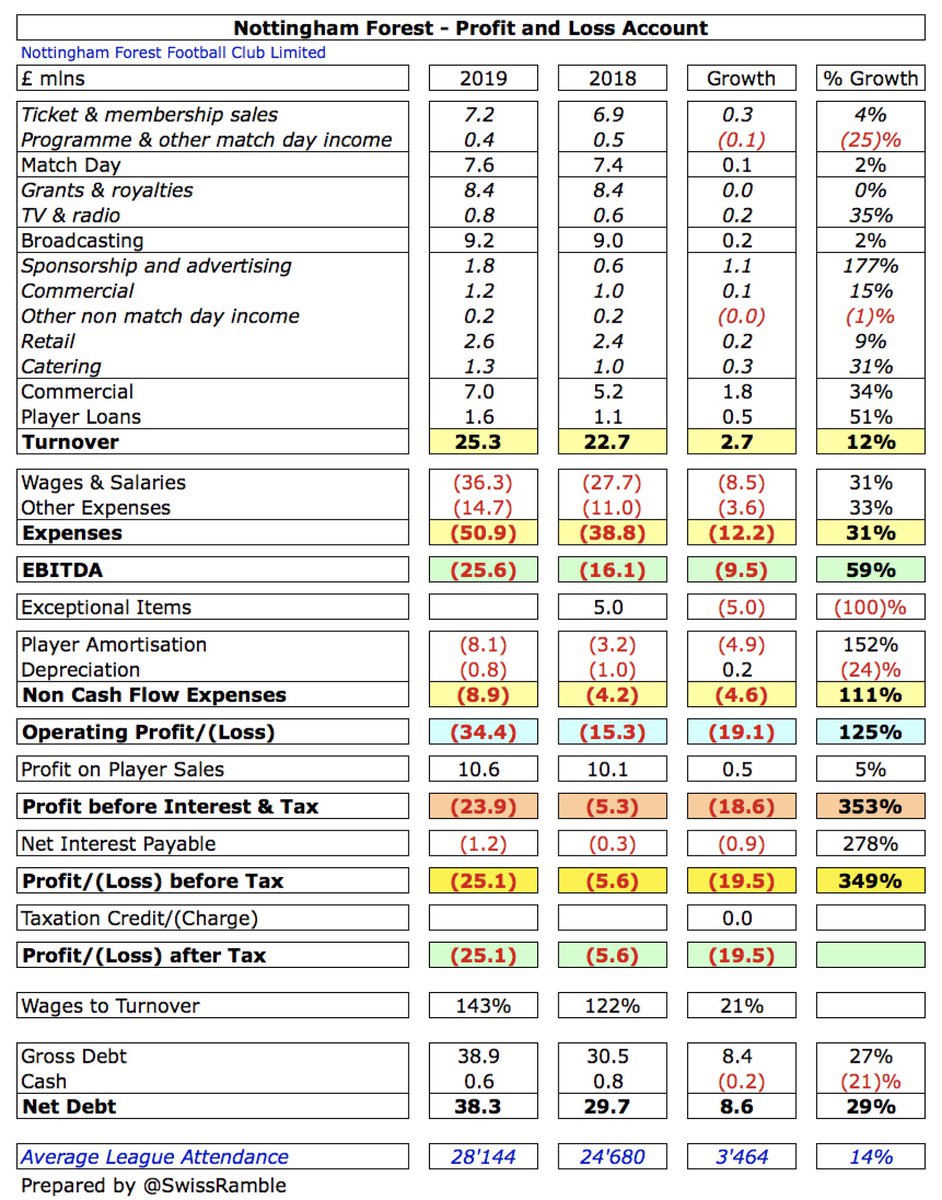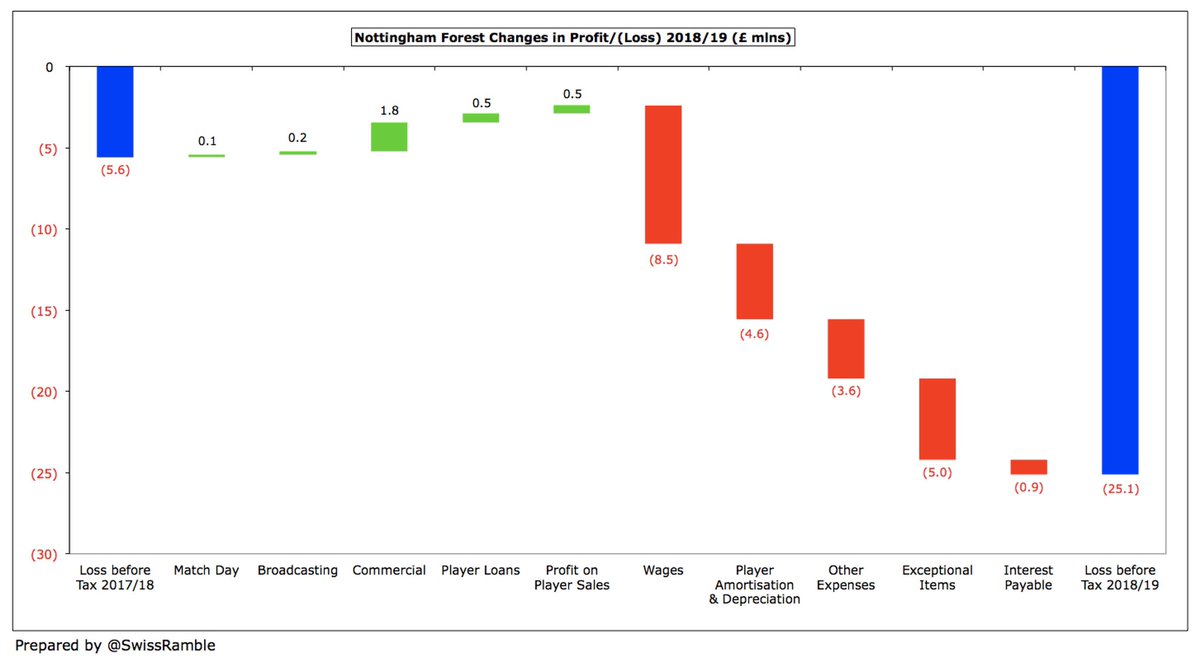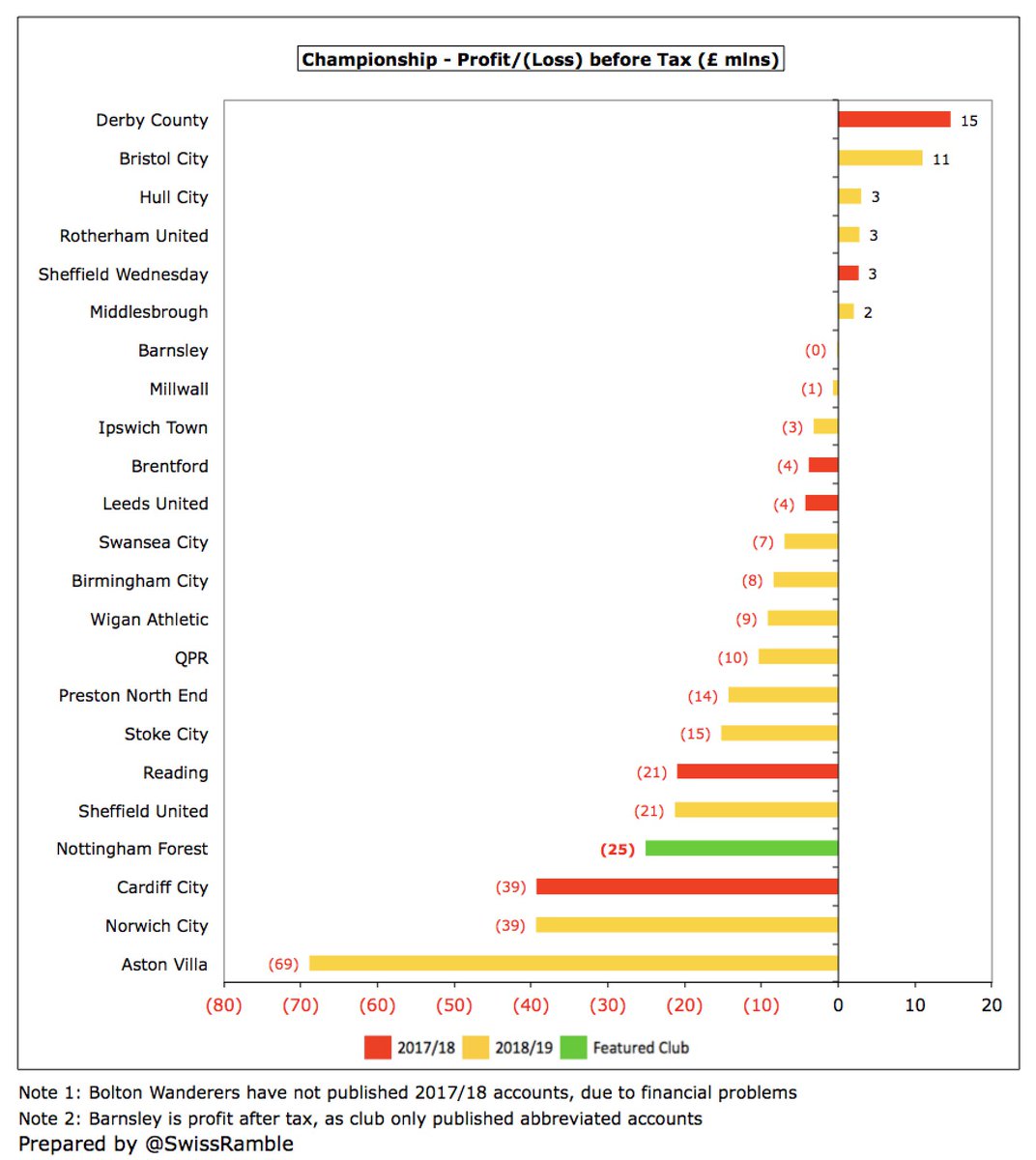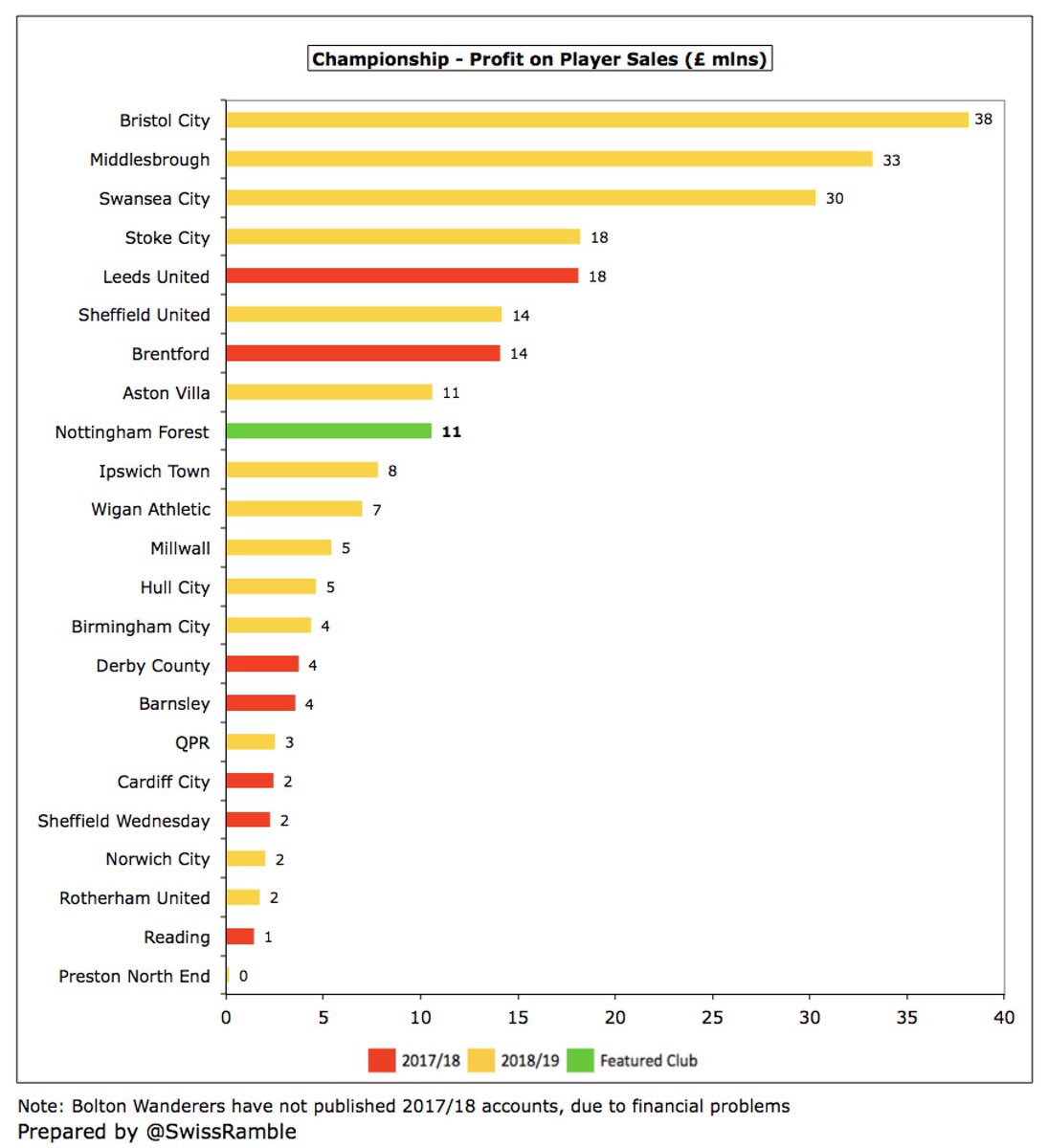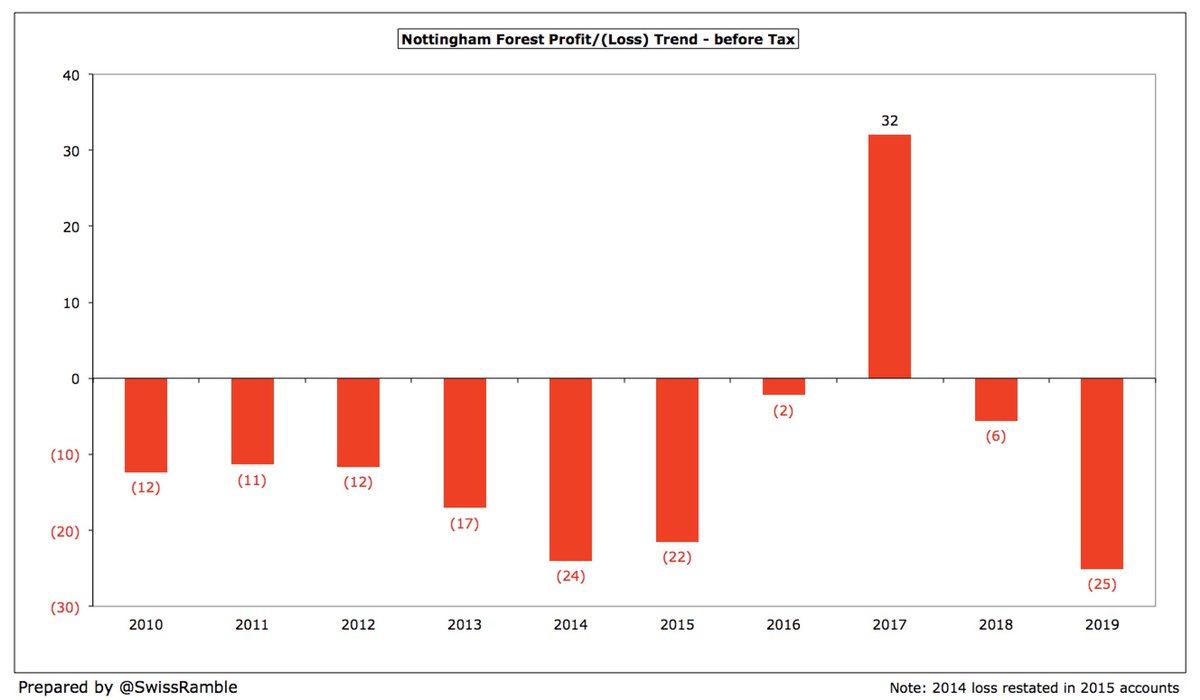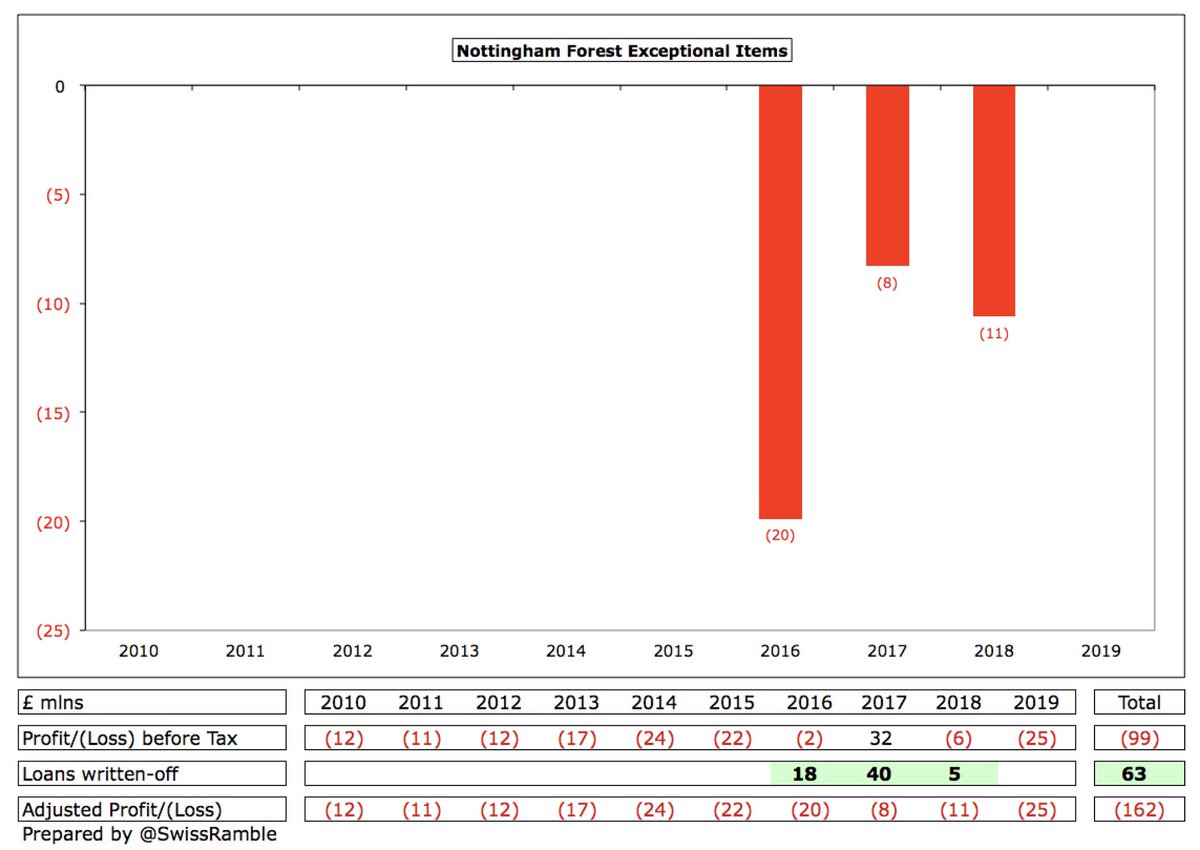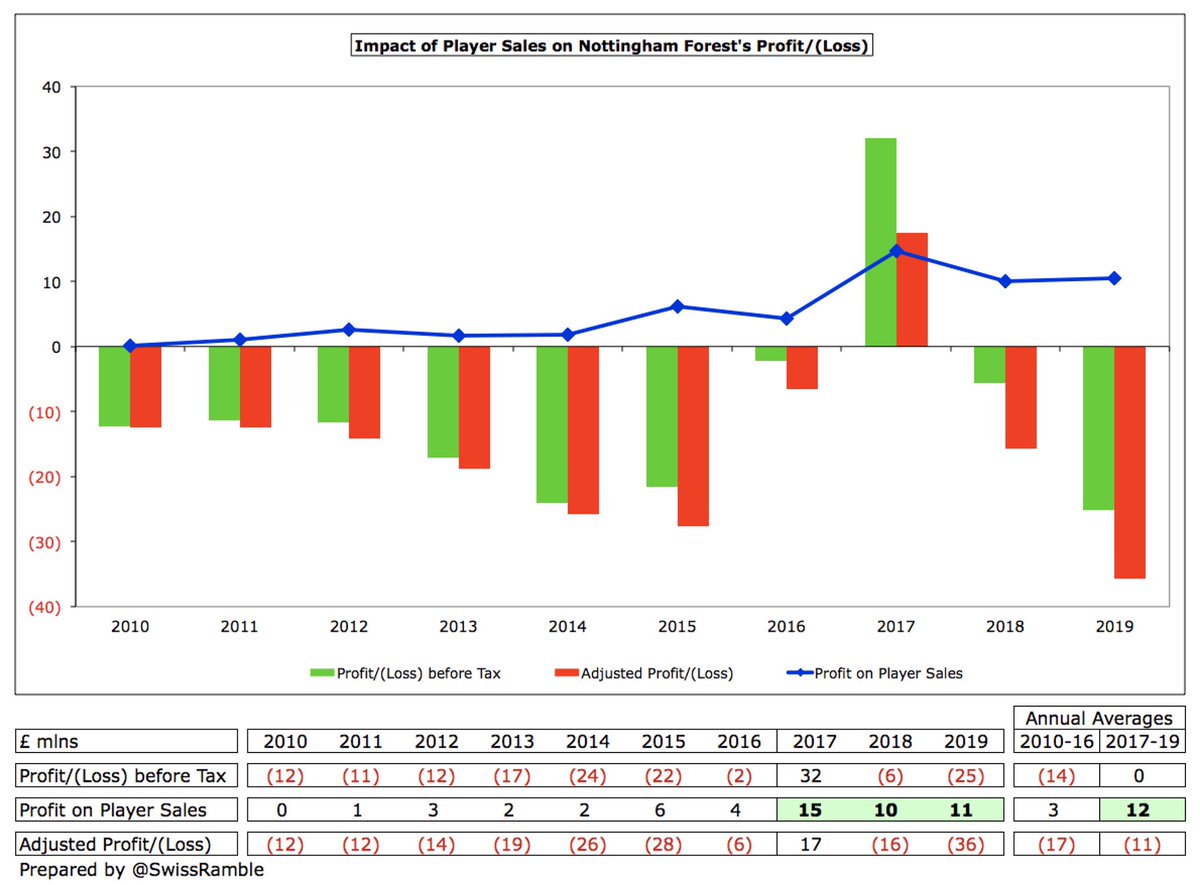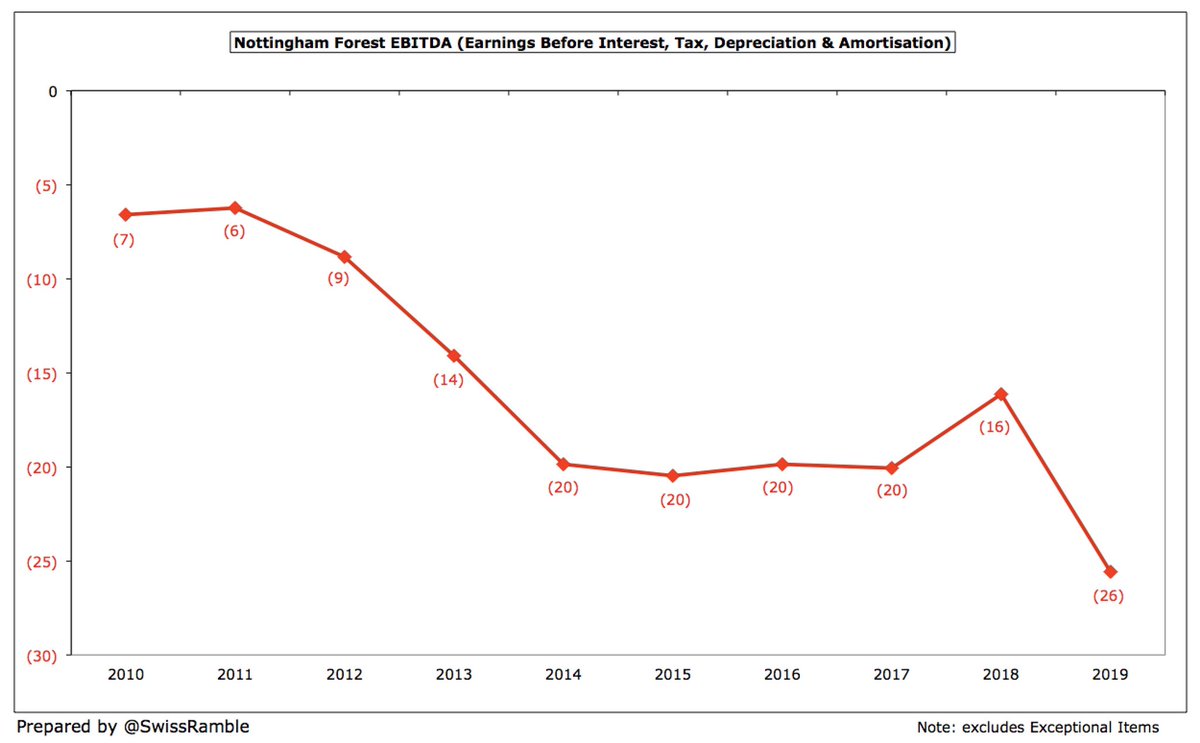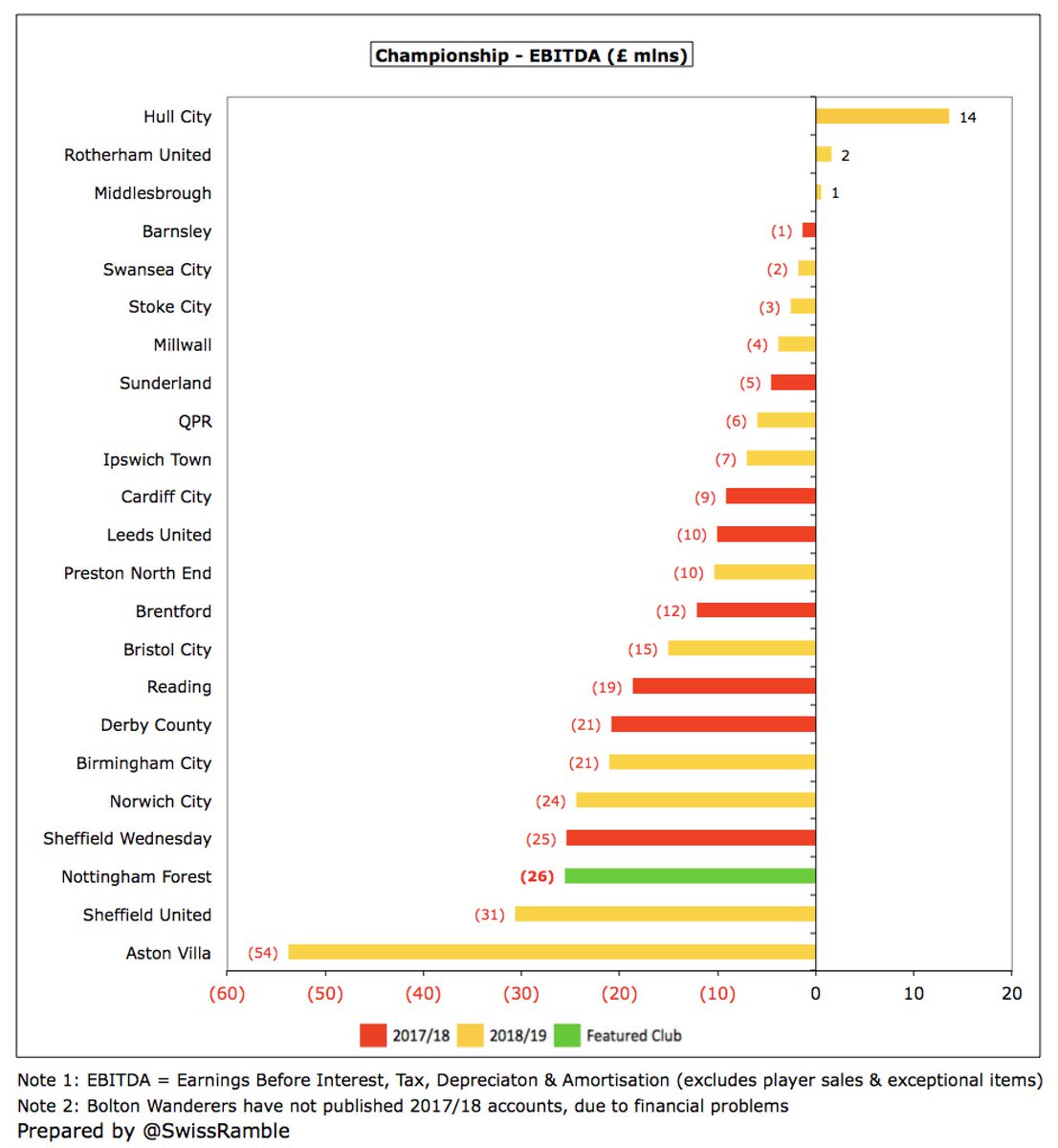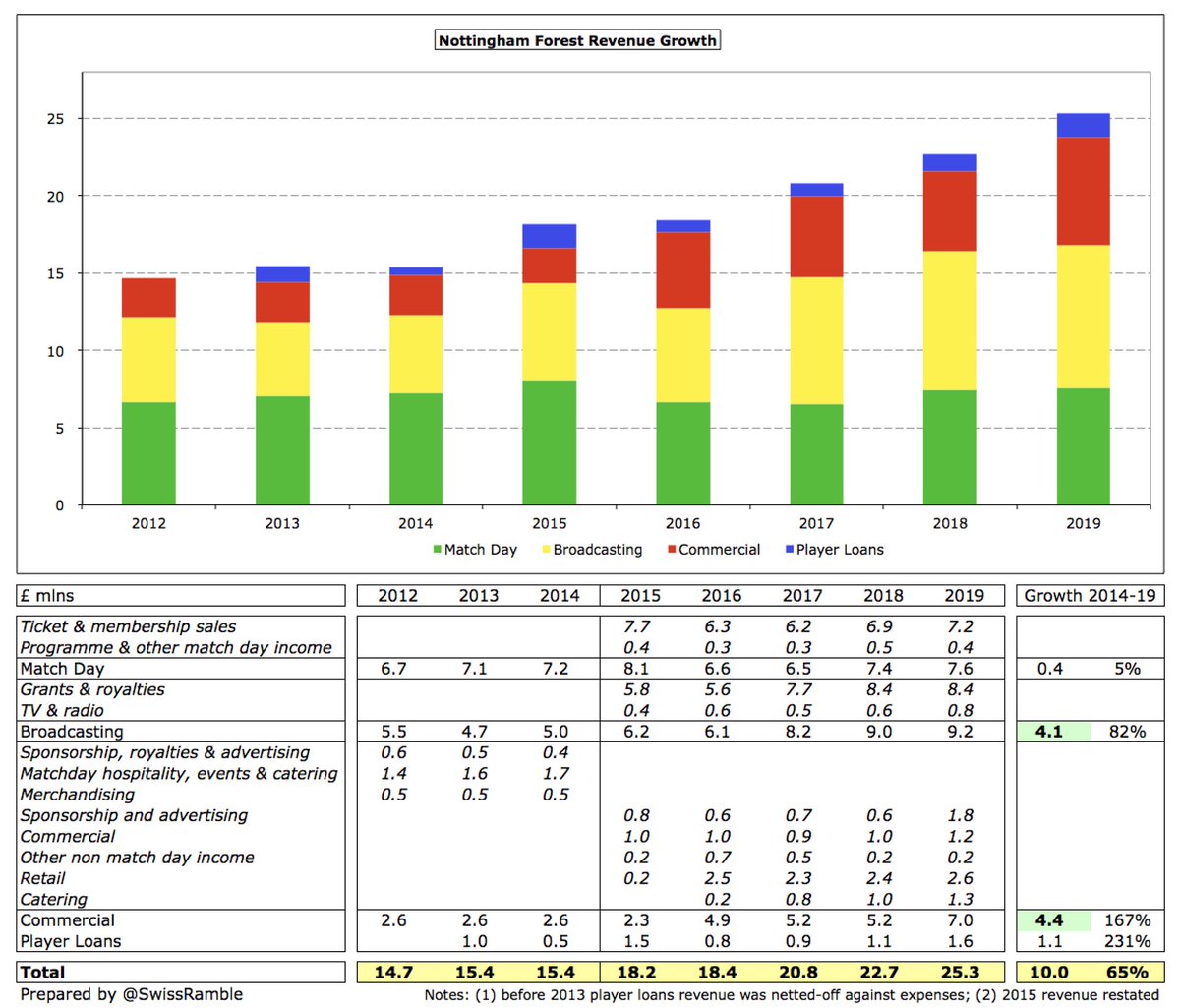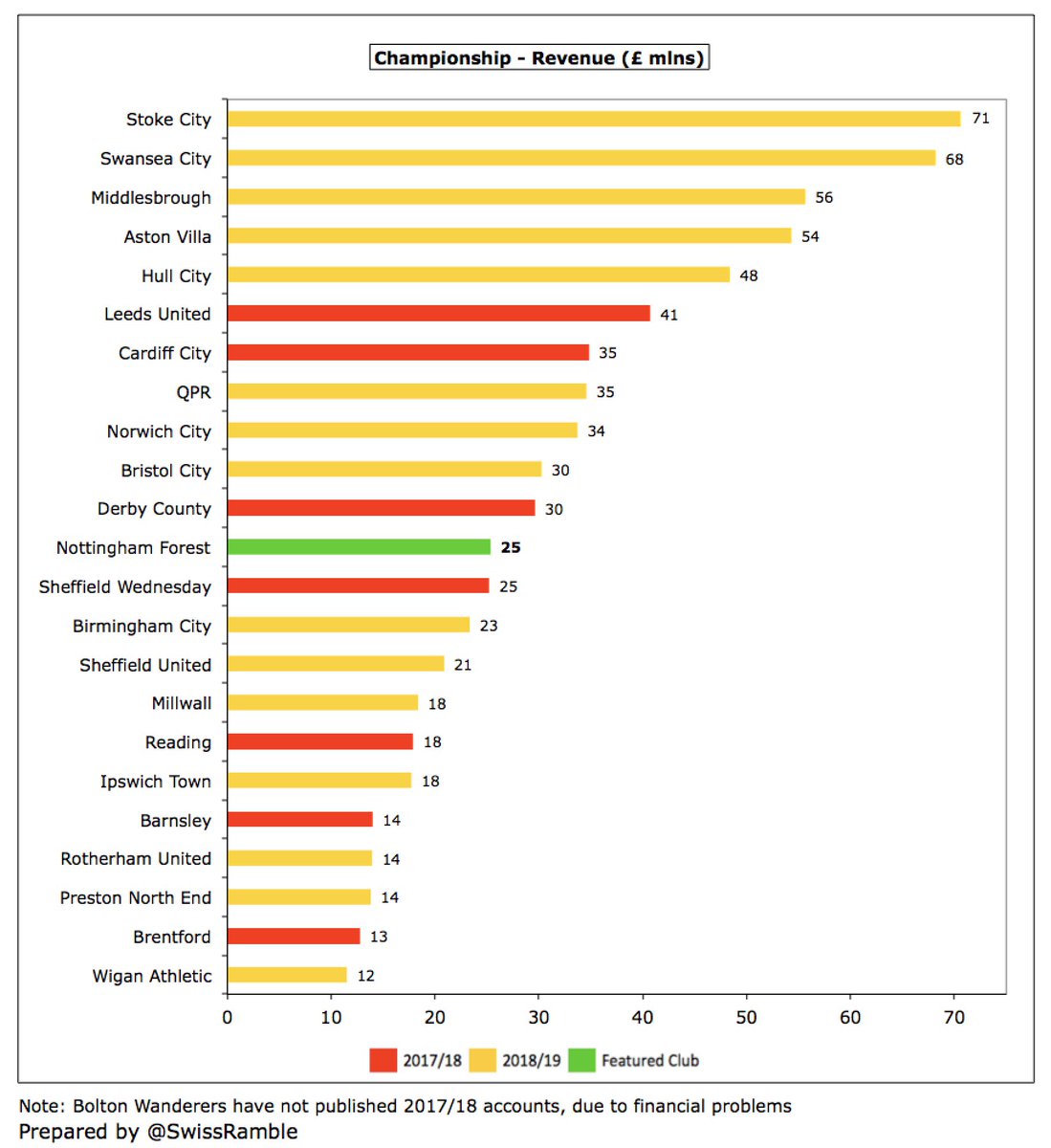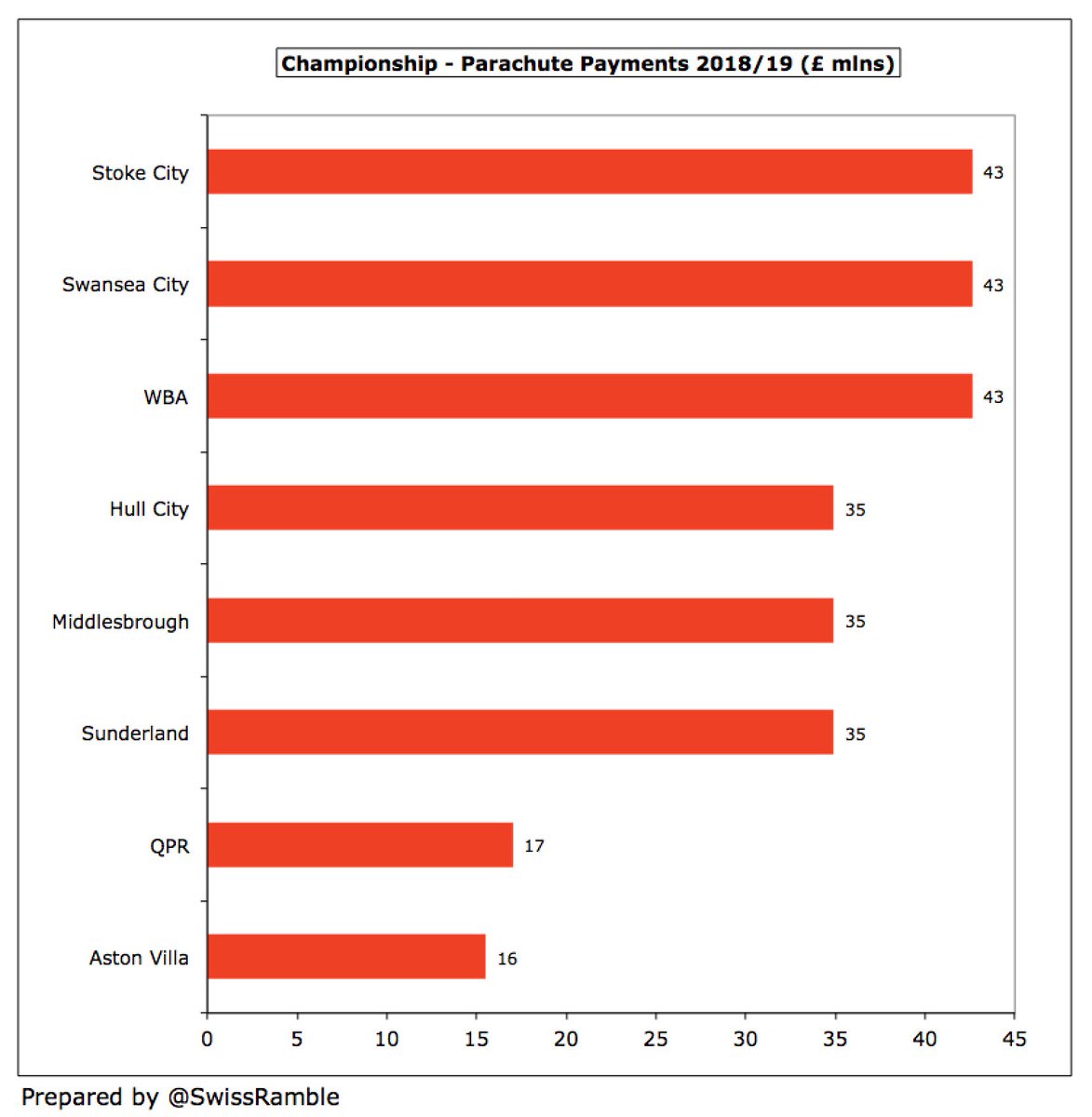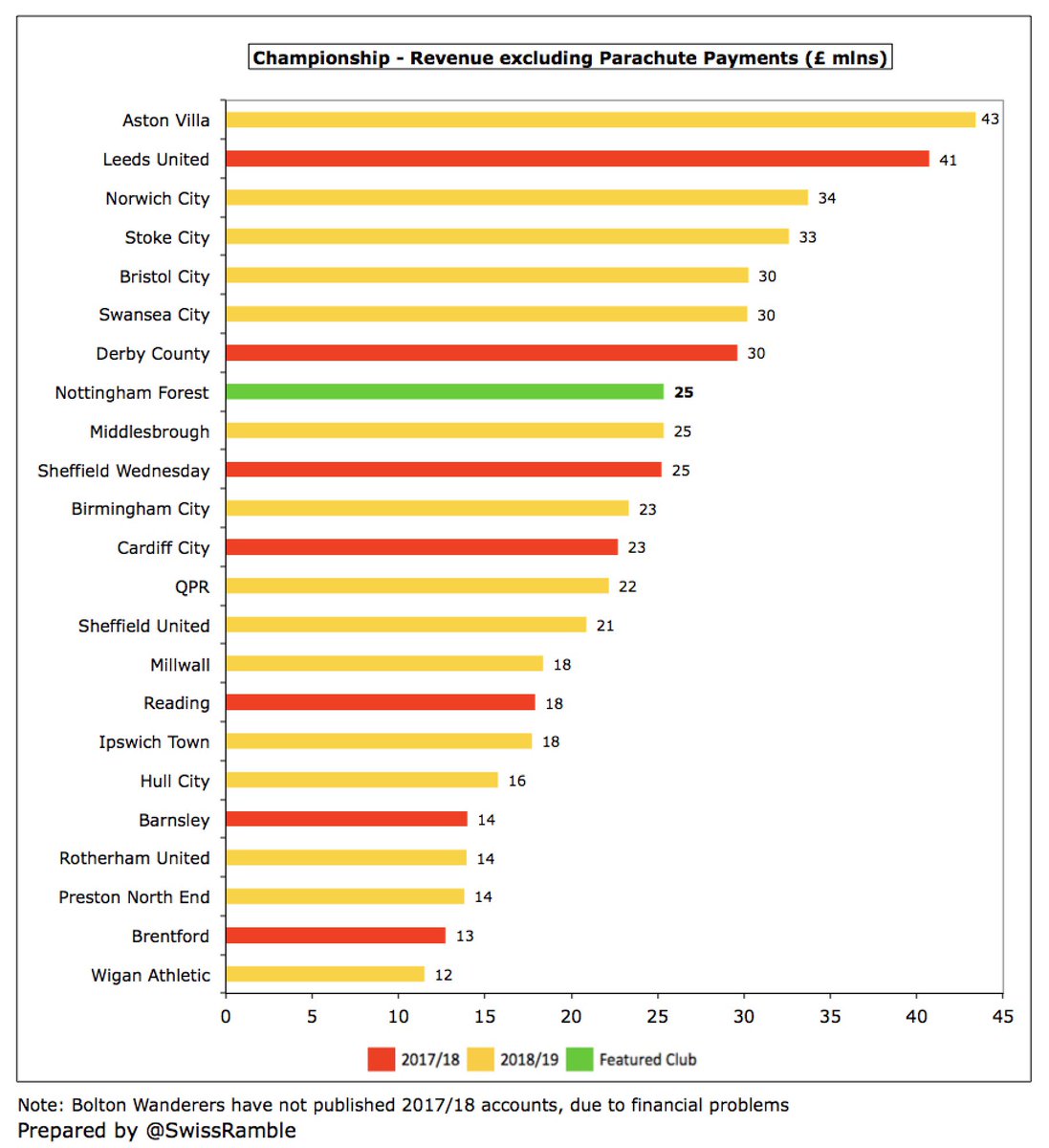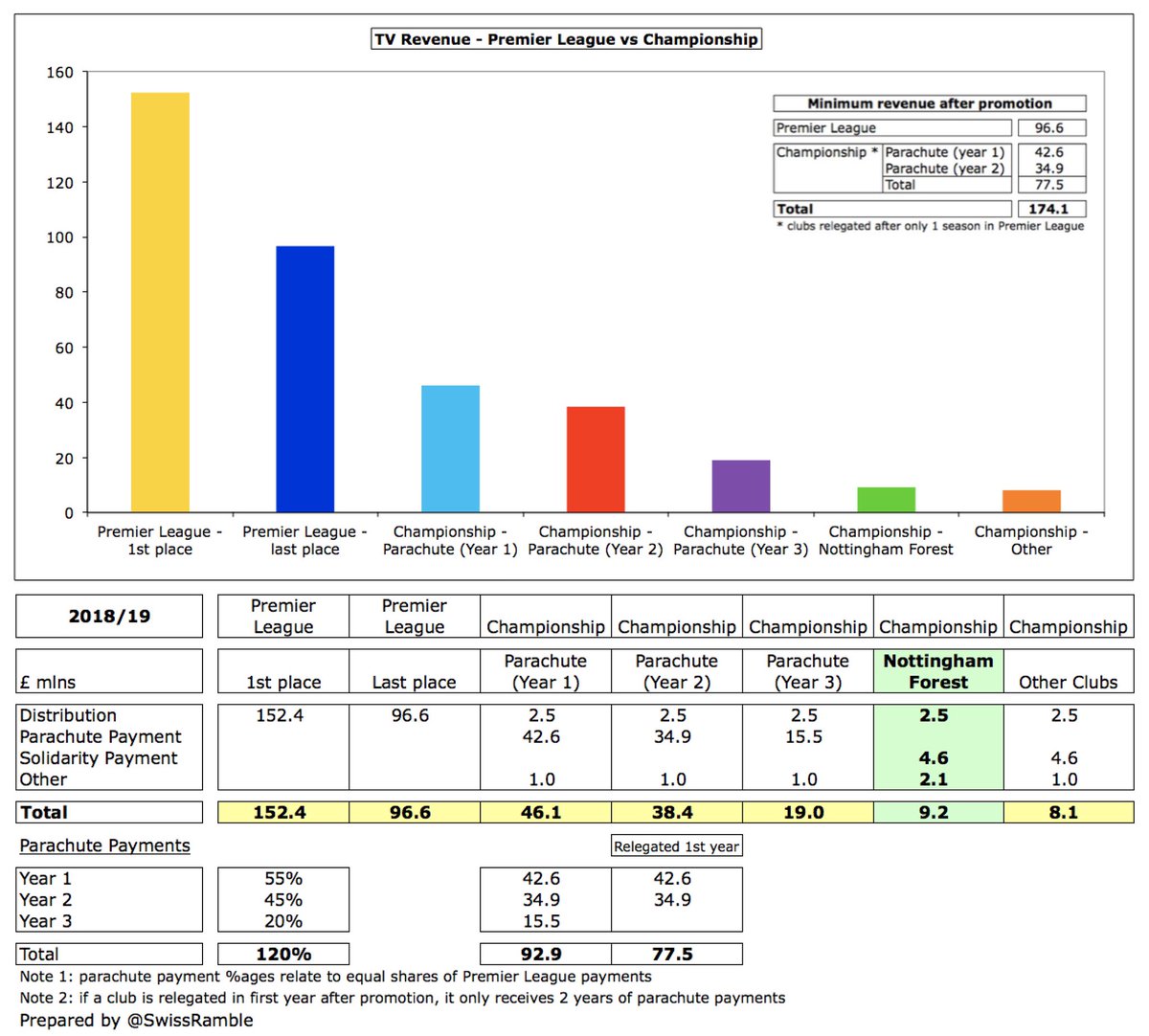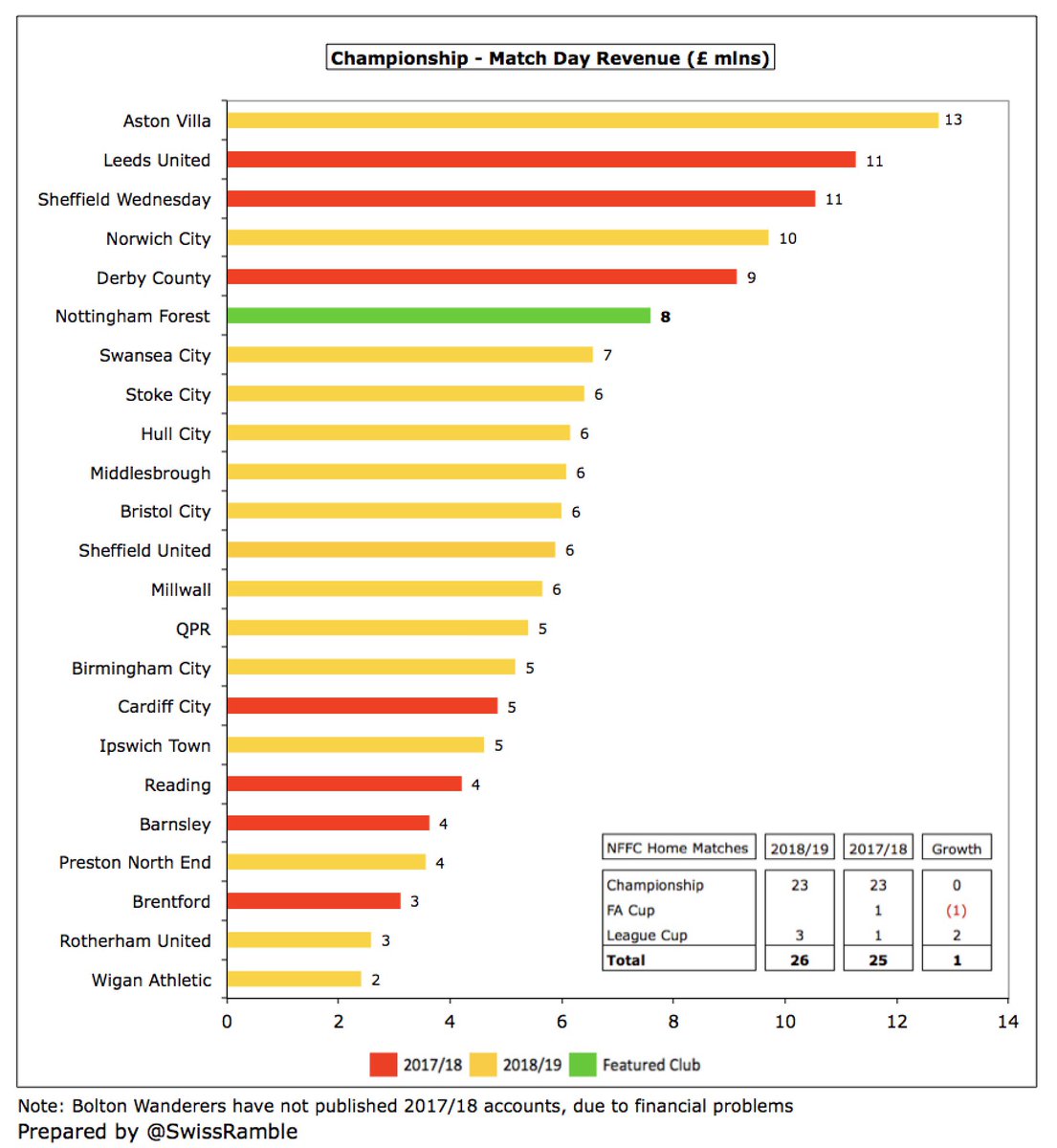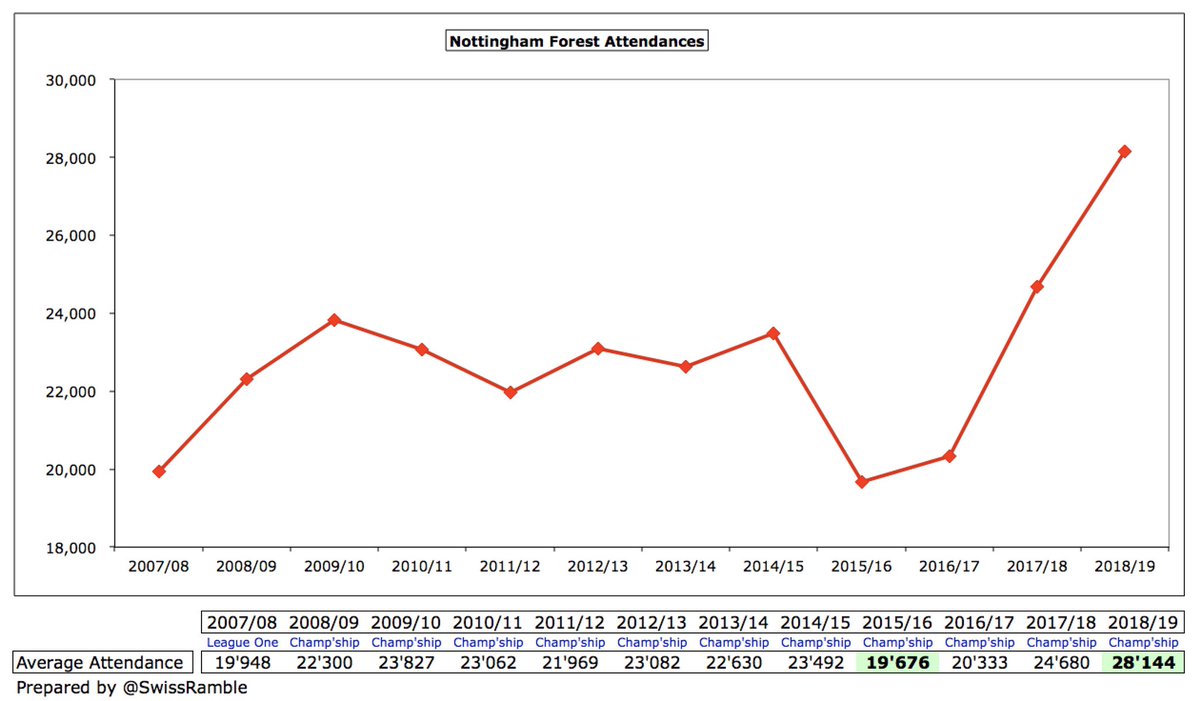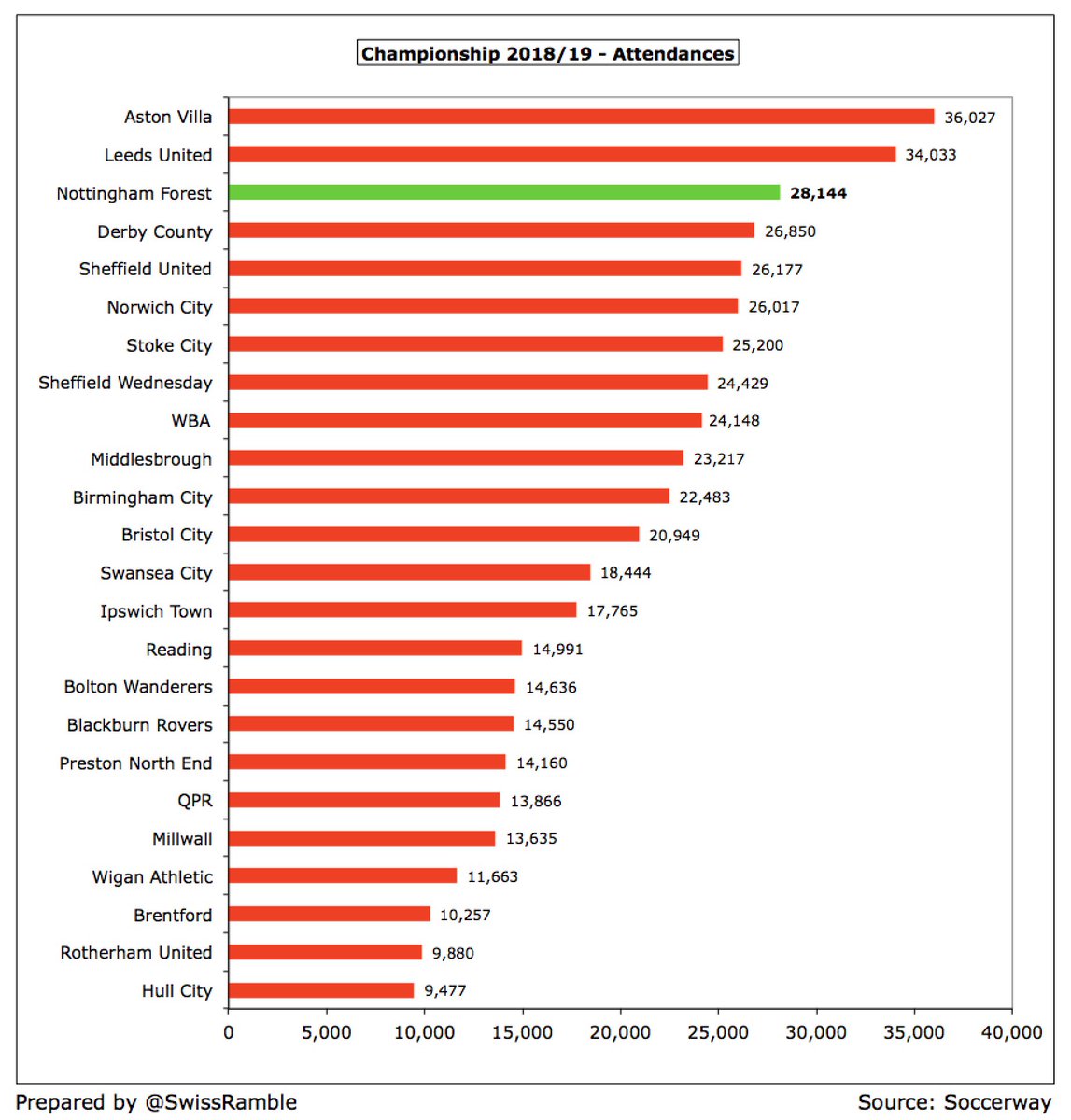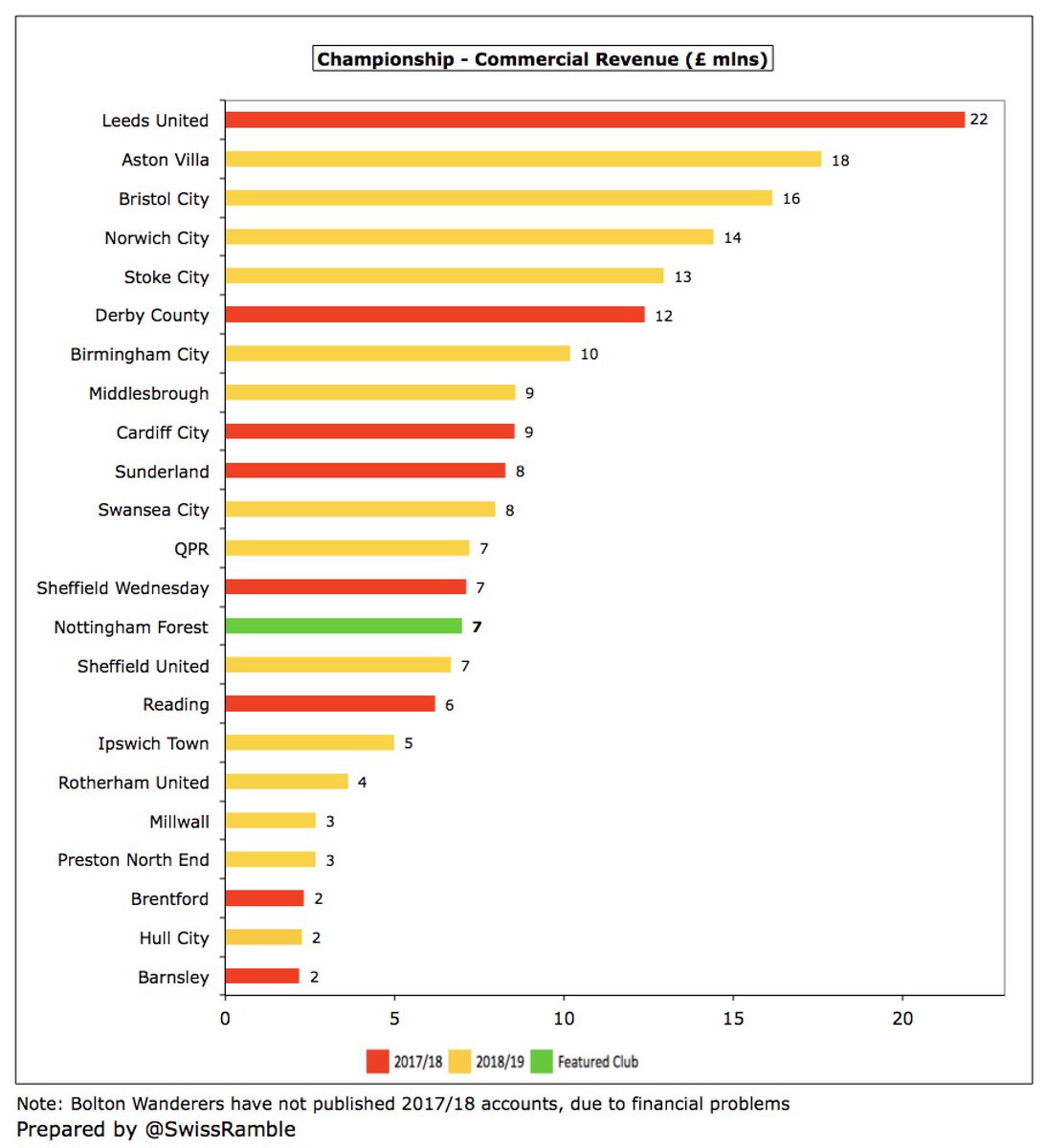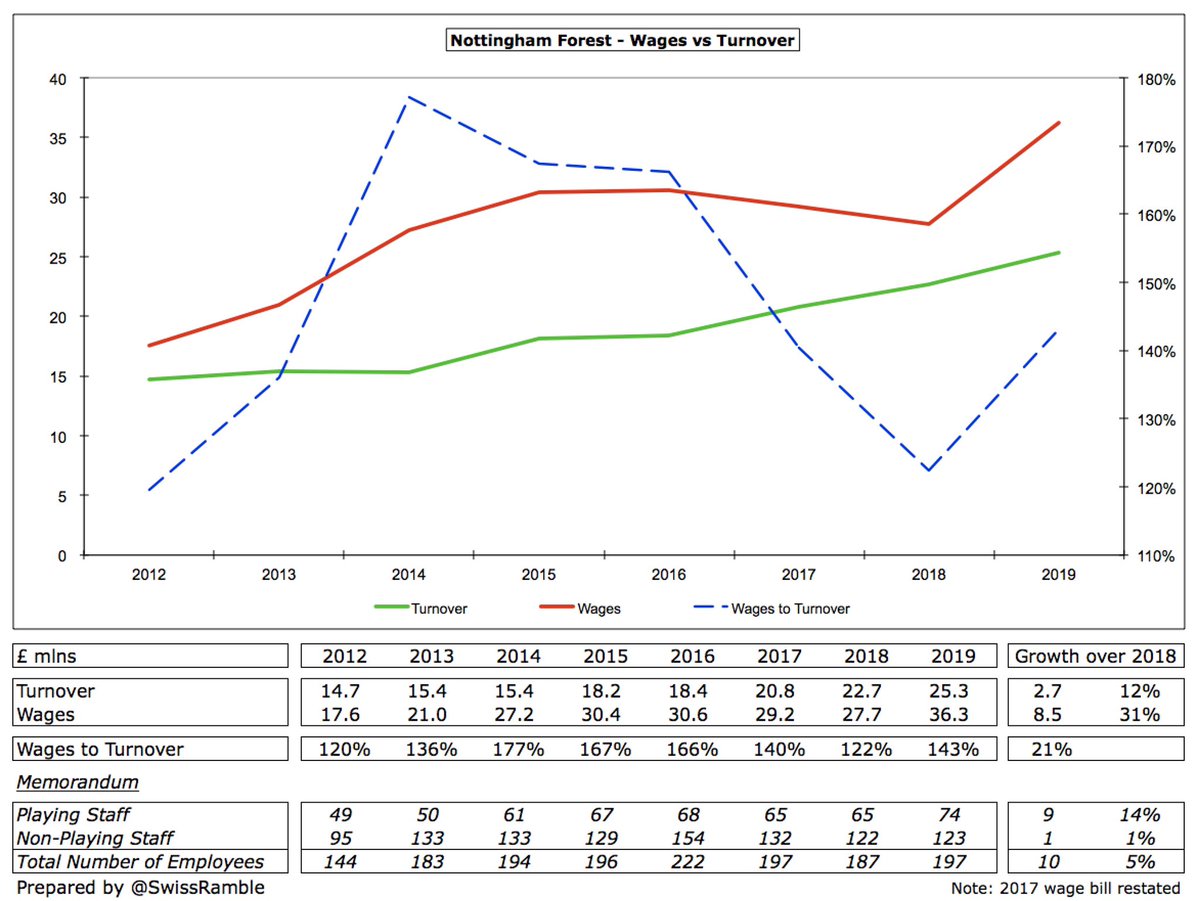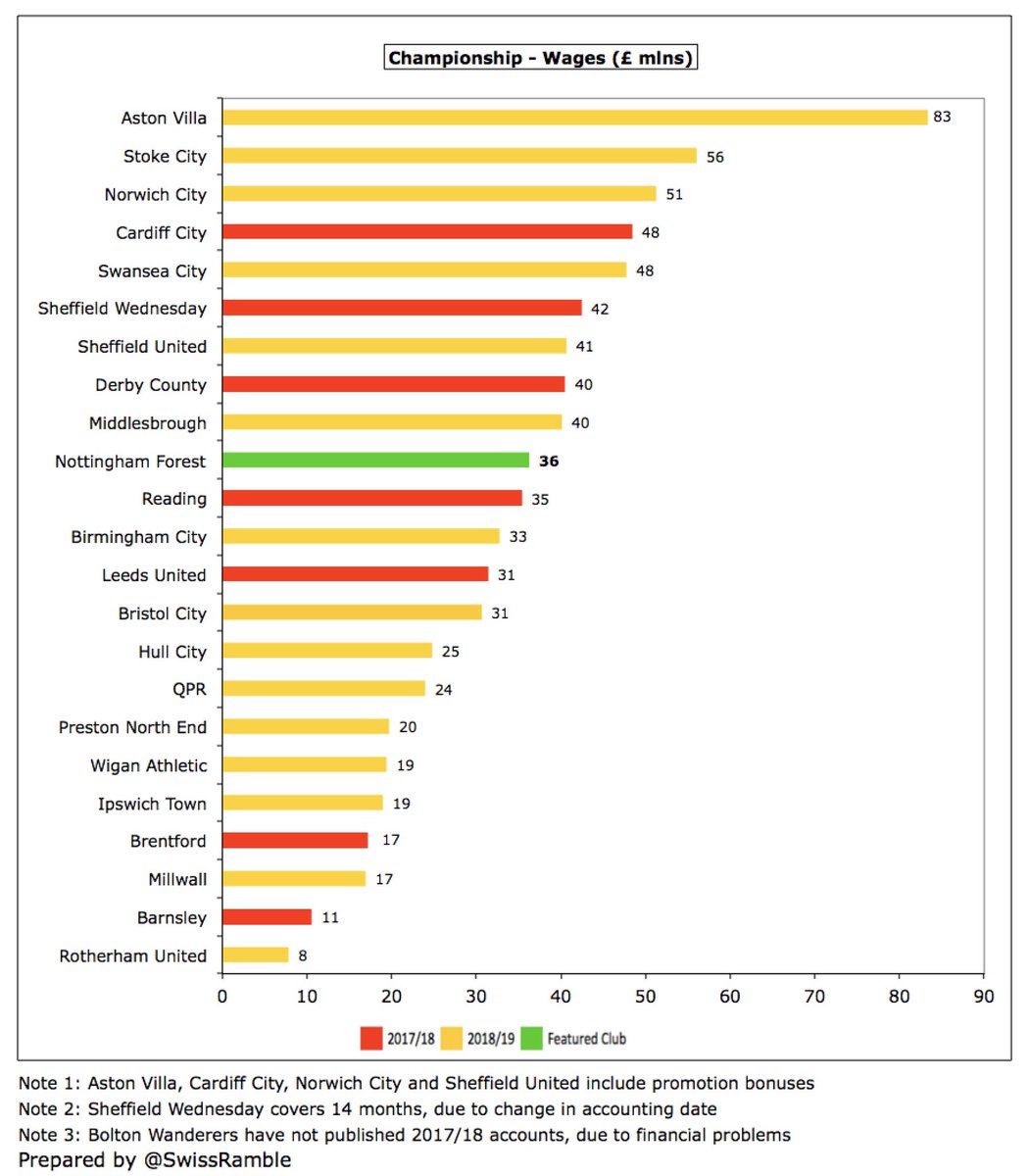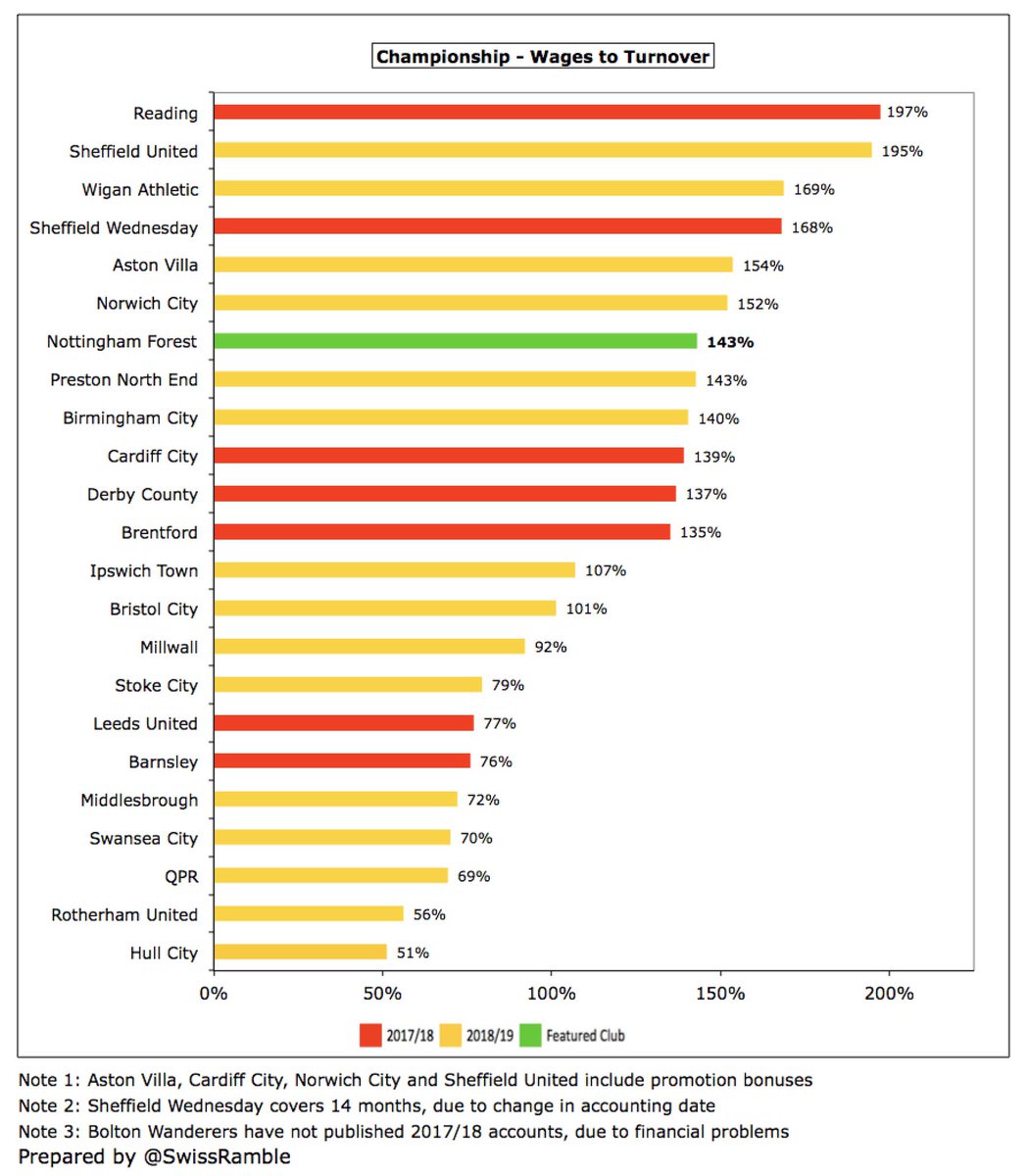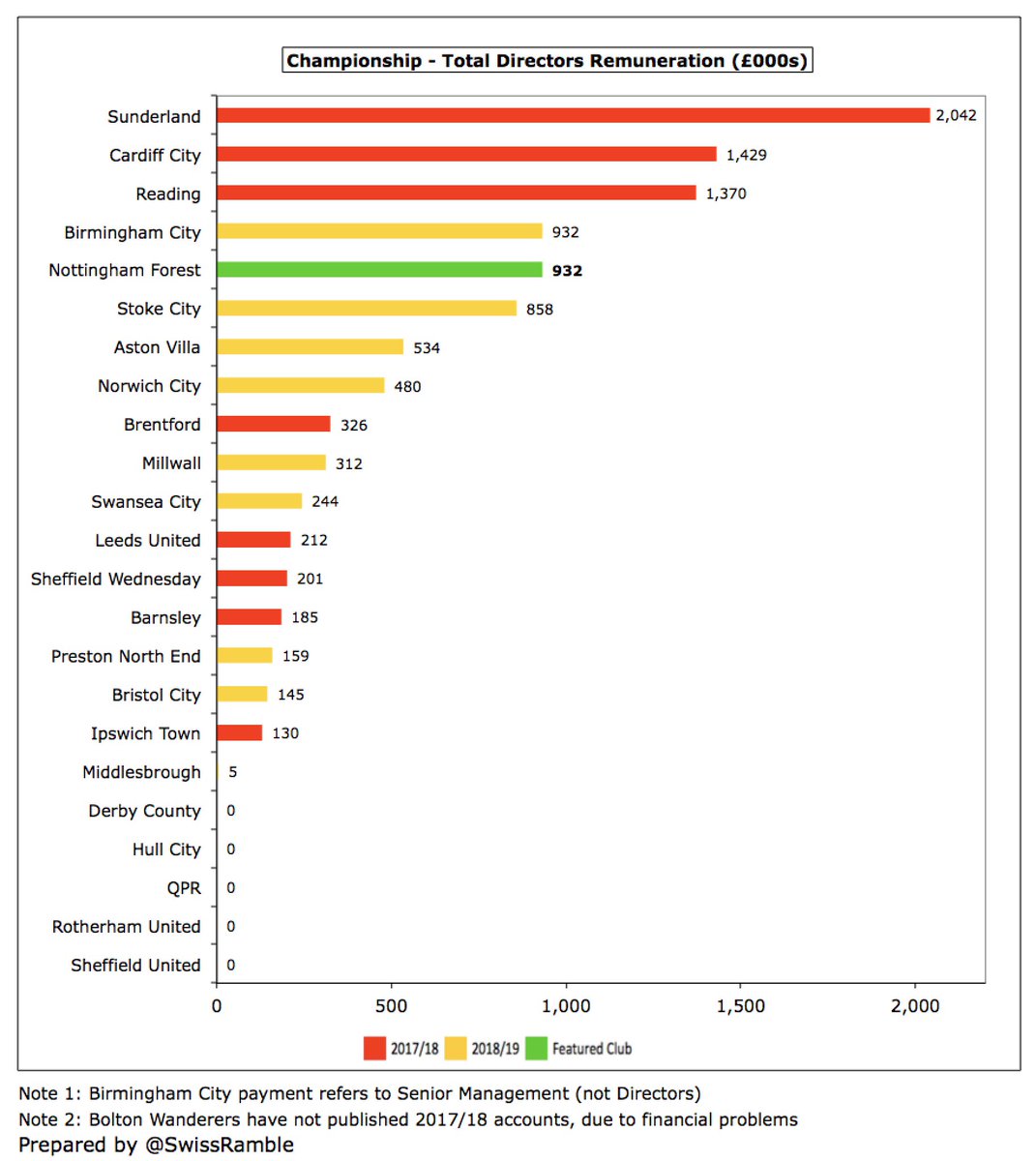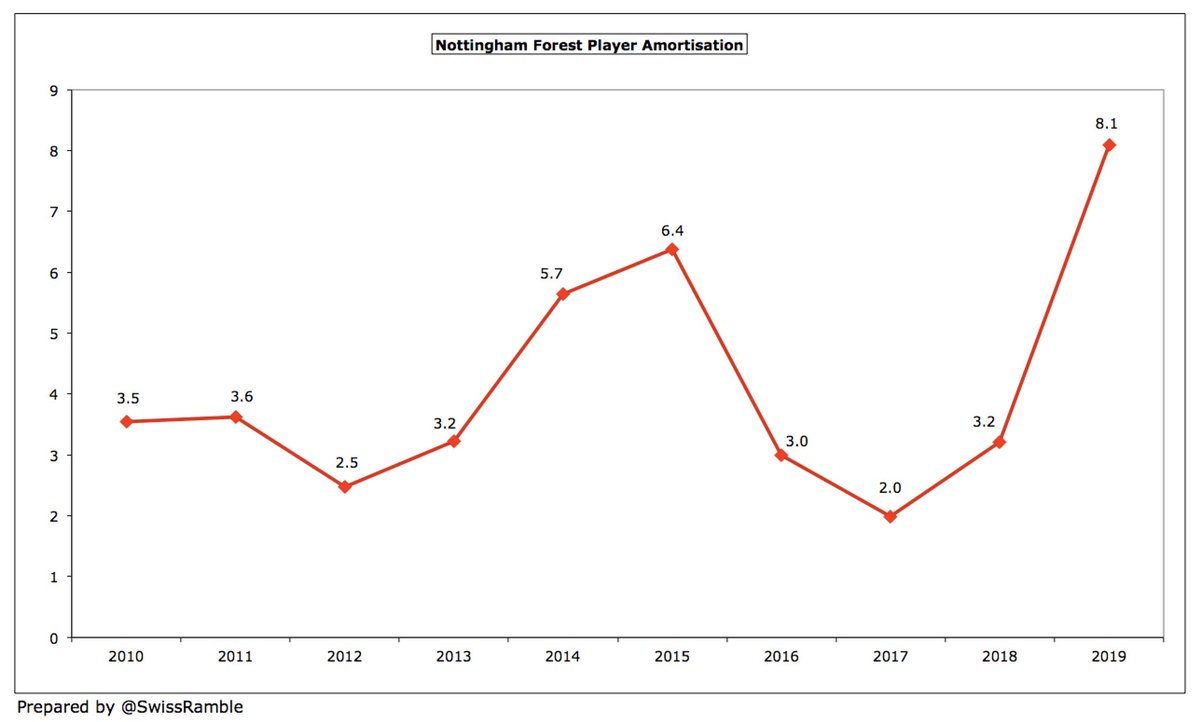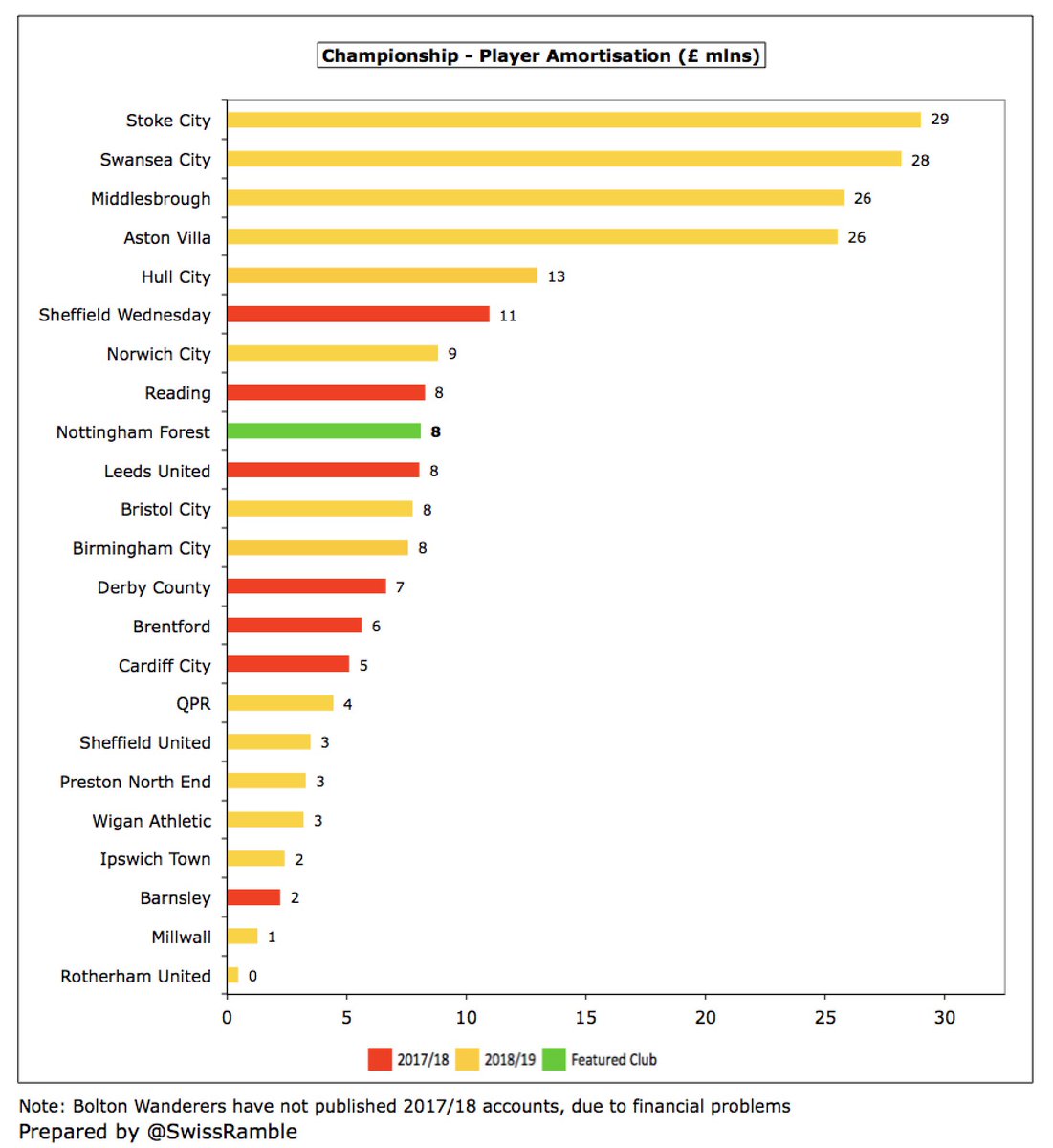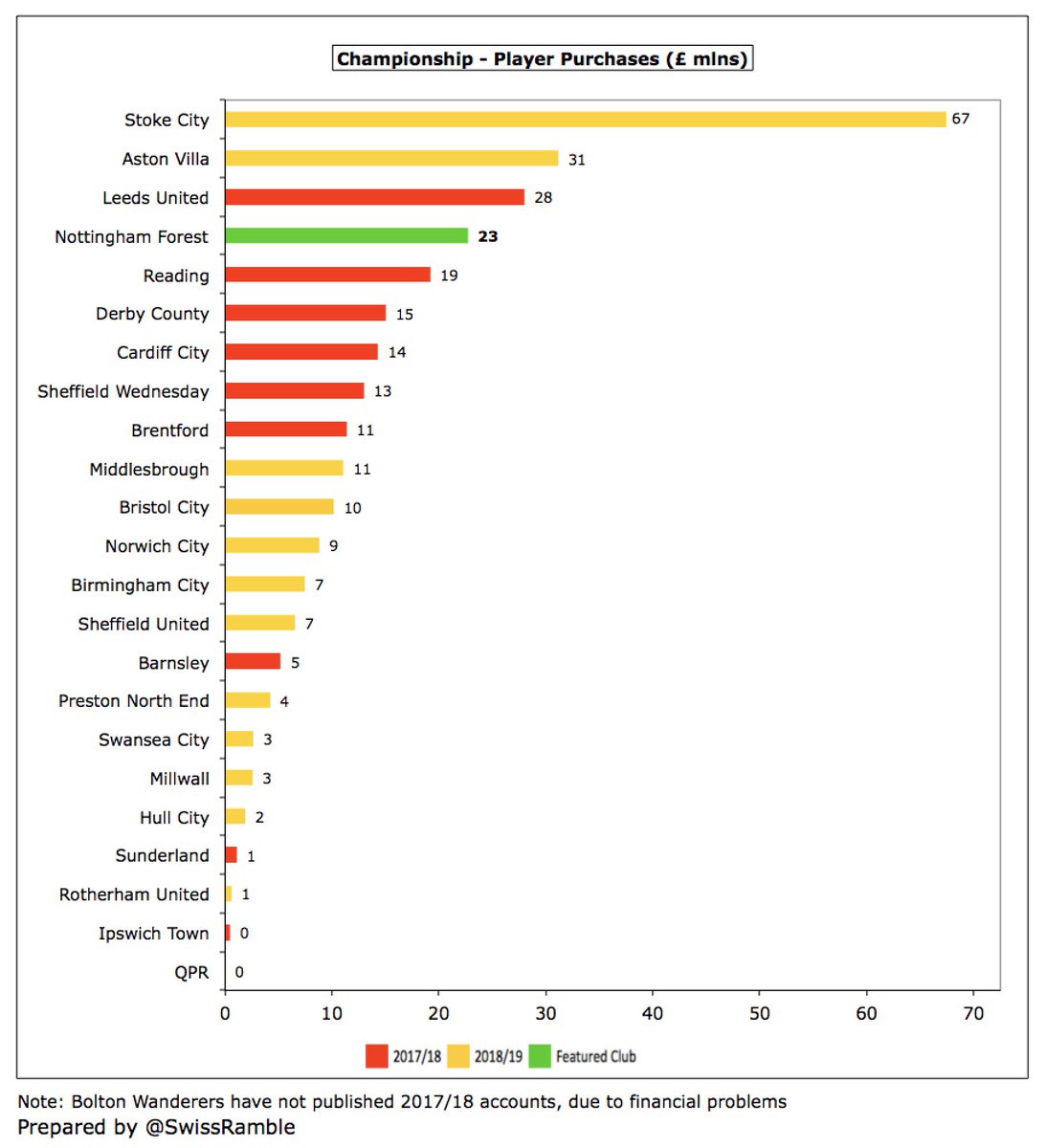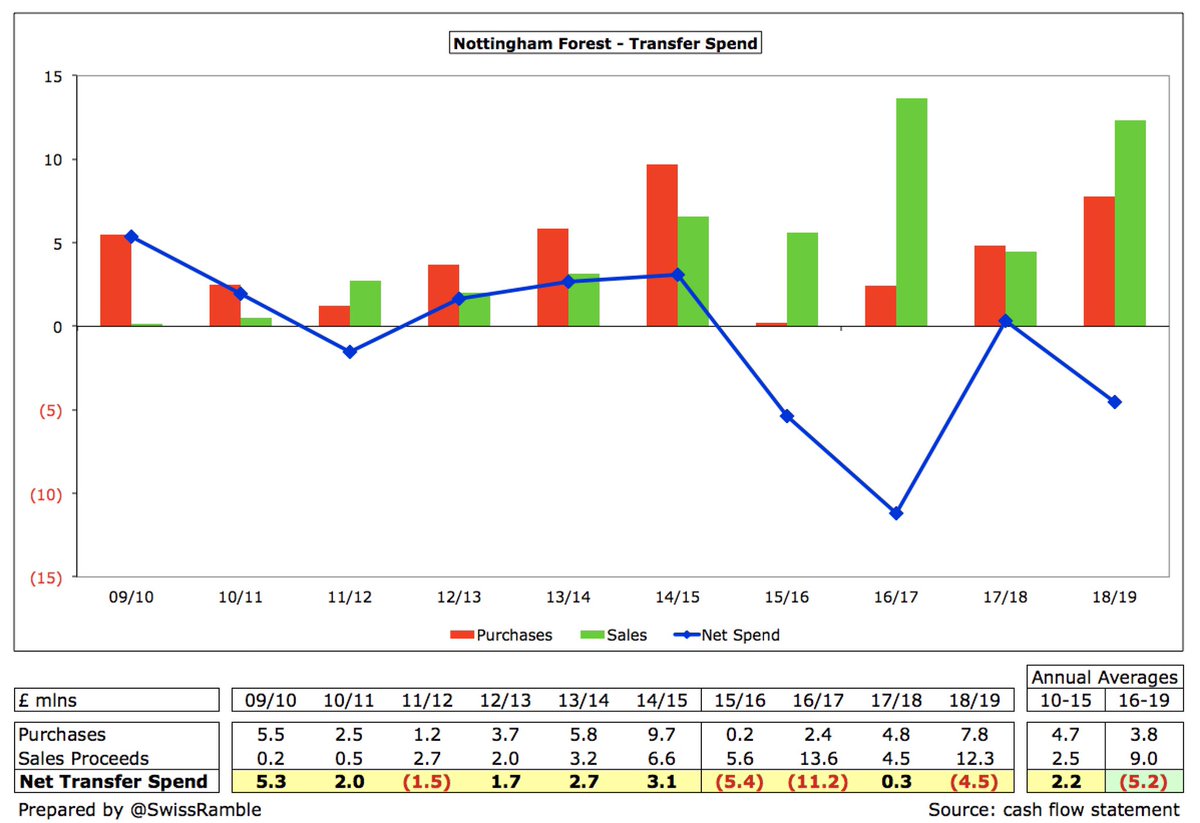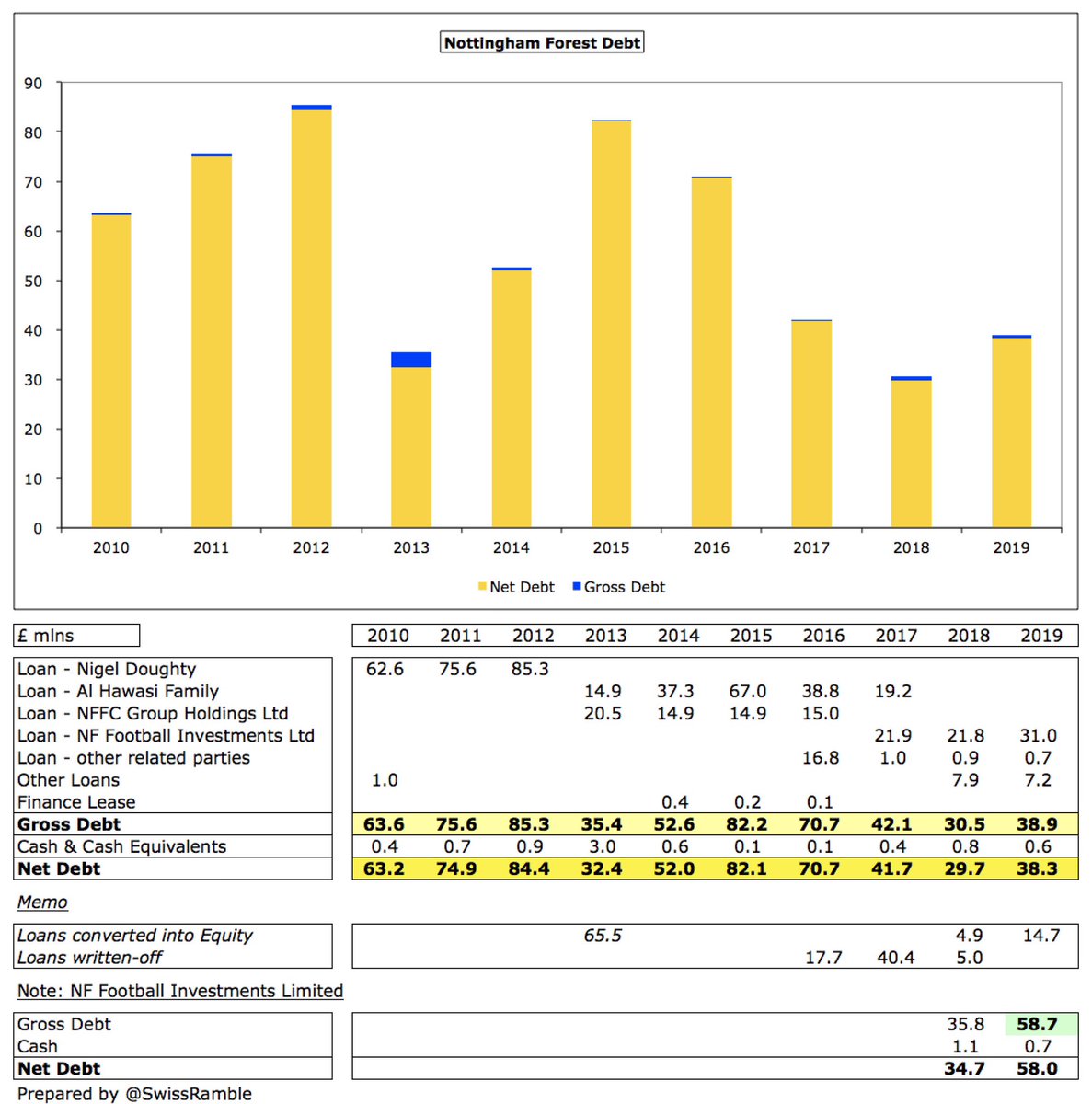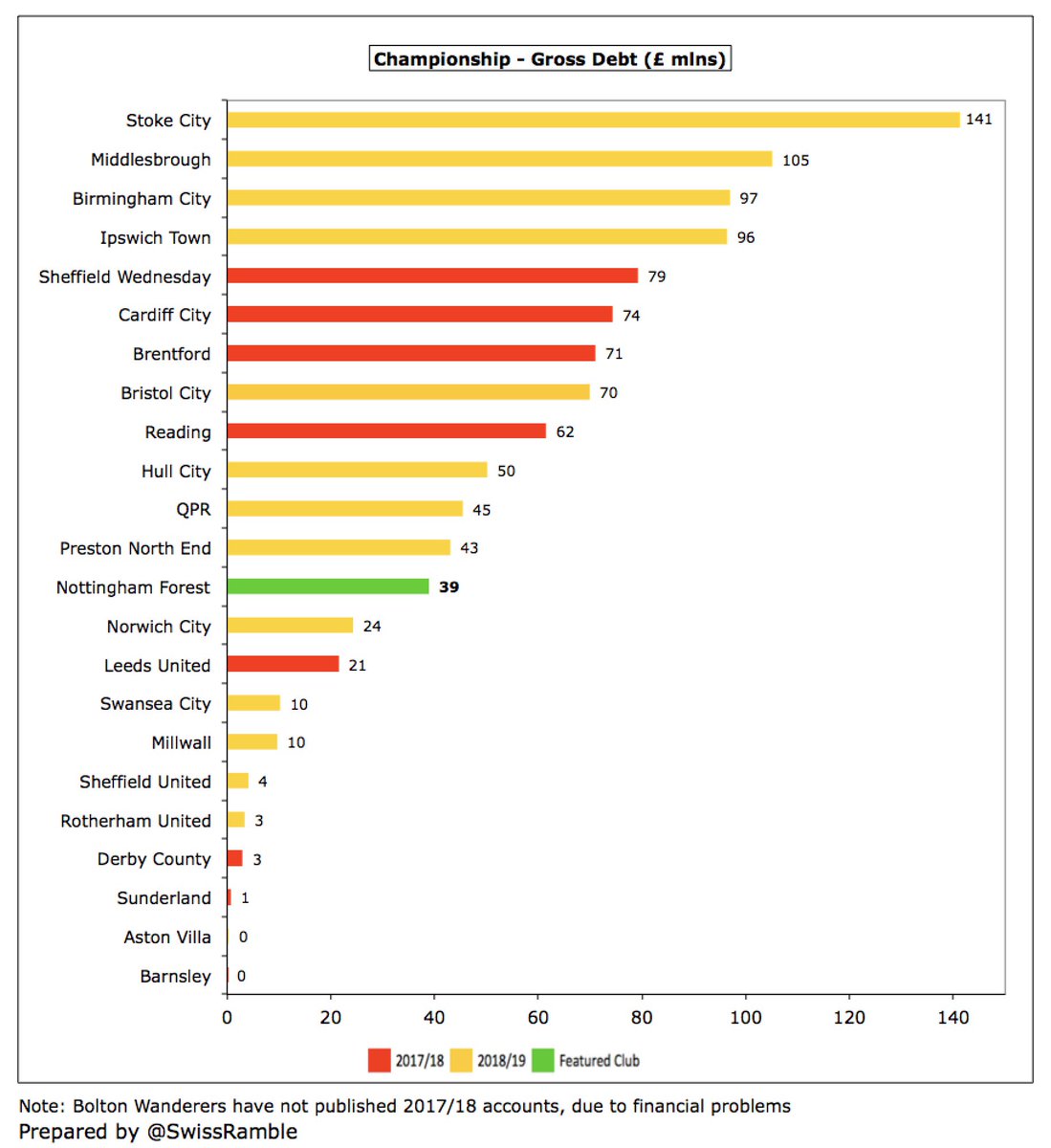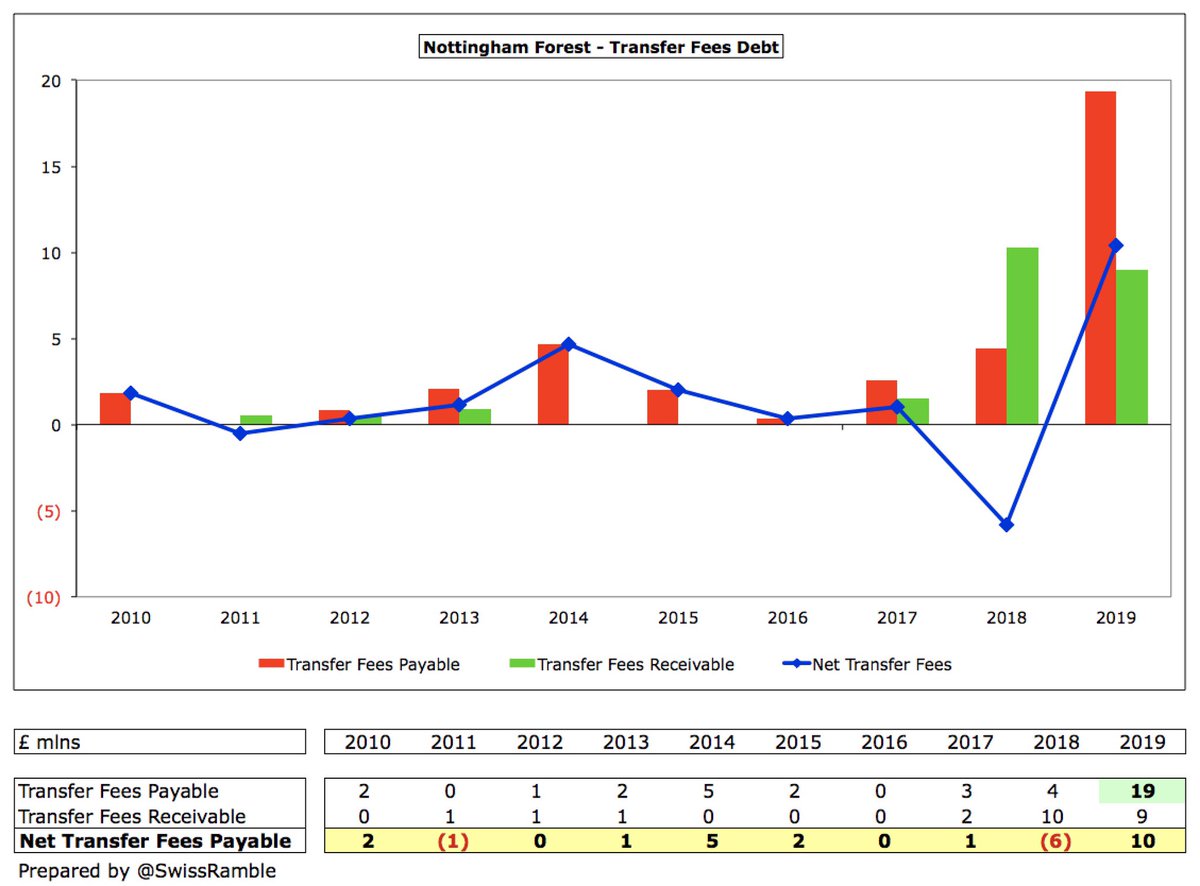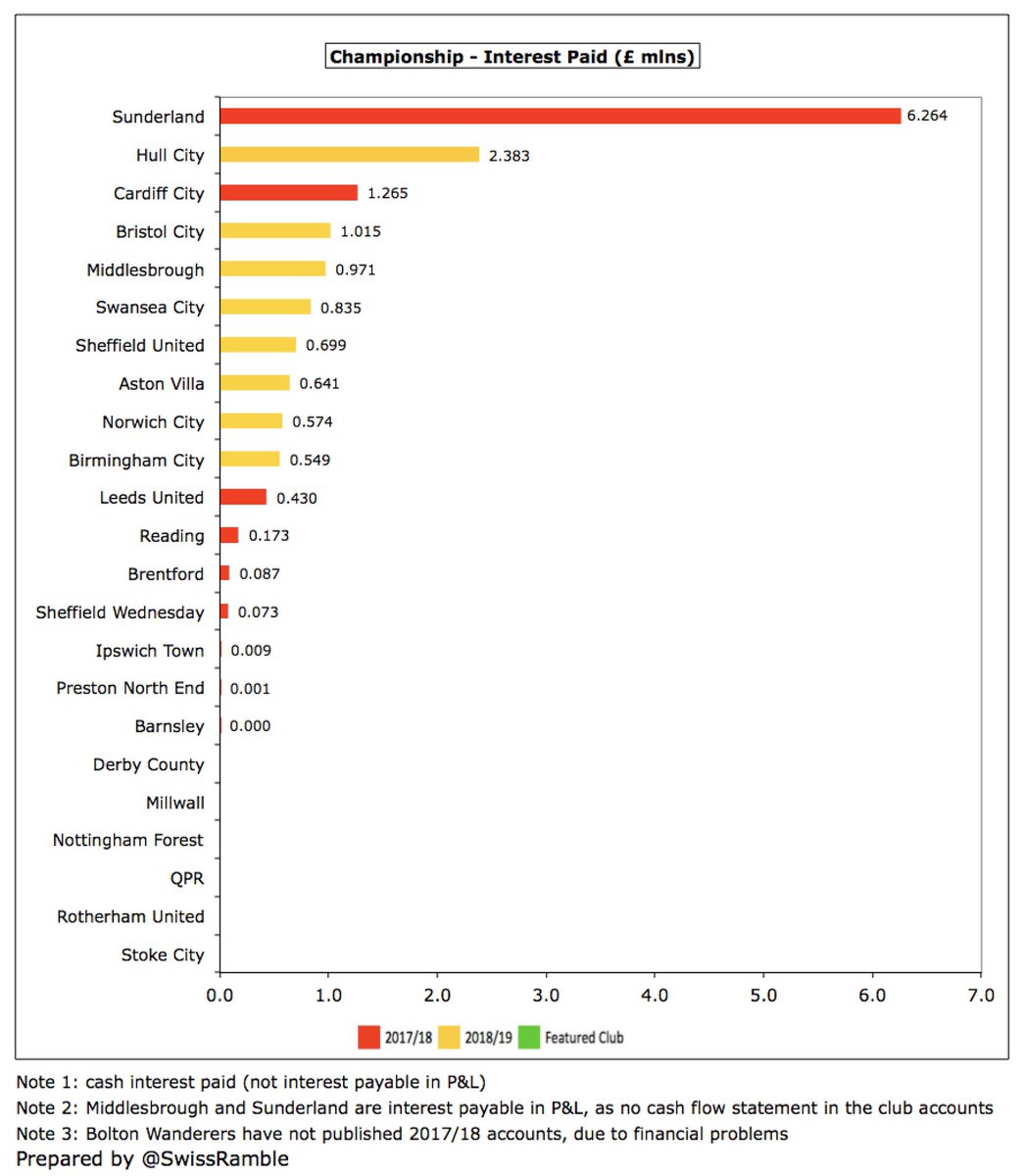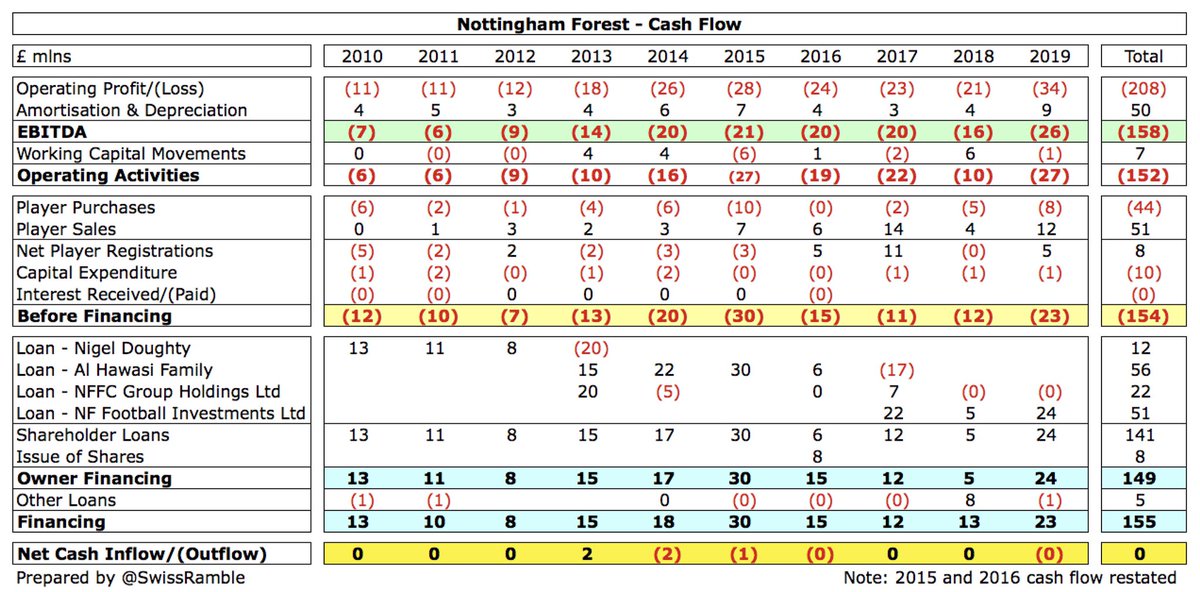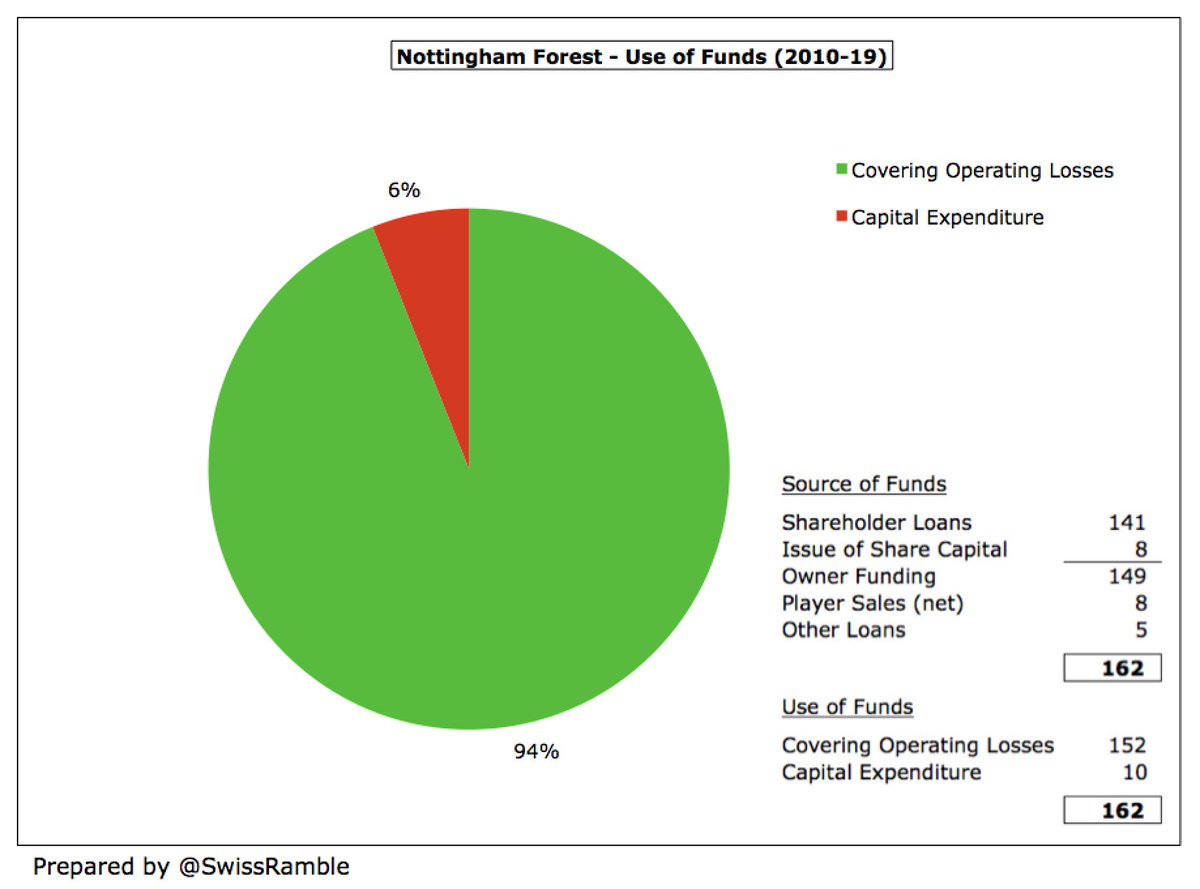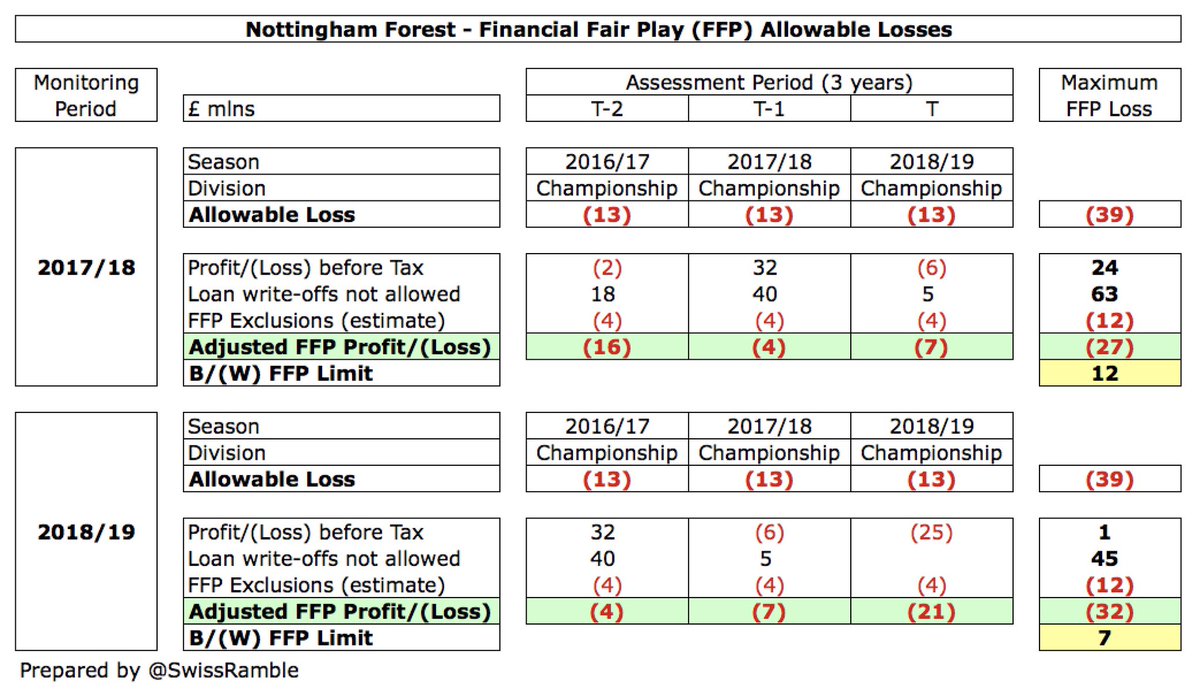Nottingham Forest’s 2018/19 financial results covered the second season under the ownership of Evangelos Marinakis (80%) and Sokratis Kominakis (20%), when they finished 9th in the Championship, their highest position since 2012/13. Some thoughts follow #NFFC
#NFFC loss widened from £6m to £25m, despite revenue increasing by £2.7m (12%) to £25.3m and profit on player sales rising £0.5m to £10.6m, as expenses shot up £18m and there was no repeat of prior year’s £5m loan write-off.
All #NFFC revenue streams were higher with the largest growth in commercial, up £1.8m (34%) to £7.0m, followed by player loans, up £0.5m (51%) to £1.6m. There were also small increases in broadcasting, up £0.2m to £9.2m, and match day, up £0.1m to £7.6m.
However, investment in the squad led to the #NFFC wage bill increasing £8.5m (31%) to £36.3m and player amortisation rising £4.9m (152%) to £8.1m. Other expenses also grew £3.6m (33%) to £14.7m, while interest payable was up from £0.3m to £1.2m.
Almost all clubs lose money in the ultra-competitive Championship, but #NFFC £25m loss is the third largest of the clubs that have reported to date in 2018/19. This was only surpassed by #AVFC £69m and #NCFC £39m, who both booked hefty promotion-related bonuses.
#NFFC figures were boosted by £10.6m profit on player sales, up from £10.1m the prior season, largely due to sale of Ben Bereton to #BRFC. This was pretty good, but a fair bit lower than large gains made elsewhere, e.g. Bristol City £38m, Middlesbrough £33m and Swansea City £30m.
#NFFC have only reported a profit once since 2005 – and that was entirely due to a £40m loan write-off in 2017. Otherwise, the club has consistently lost money, amounting to just under £100m in the last decade.
#NFFC losses would have been much higher without owners writing-off £63m of loans: 2016 £18m, 2017 £40m and £2018 £5m. The largest write-off came in 2017 when Greek owner Evangelos Marinakis bought the club from Fawaz Al Hasawi.
Player sales have also become increasingly important for #NFFC, who have averaged £12m profit in the last three seasons, including £15m in 2016/17 (Burke & Lansbury) and £10m in 2017/18 (Assombalonga). Should also be decent this season (Appiah, Osborn and Chema).
#NFFC underlying profitability is poor, as shown by their EBITDA (Earnings Before Interest, Depreciation and Amortisation), which strips out profit on player sales and exceptional items. This has been consistently negative, further falling in 2018/19 from £(16)m to £(26)m.
In fairness, very few Championship clubs manage to generate positive EBITDA, but #NFFC’s £(26)m is the third worst in the division, only behind #AVFC £(54)m and #SUFC £(31)m, who both paid out significant promotion bonuses.
#NFFC revenue has grown by two-thirds (£10.0m) from £15.4m to £25.3m in the 5 years since 2014, though £3.9m of that is from bringing back in-house retail operations and catering. Another £4.1m is from broadcasting, mostly due to increase in PL solidarity payments.
Despite the growth, #NFFC £25m revenue is mid-table in the Championship, significantly below clubs benefiting from parachute payments following relegation from the Premier League, such as Stoke City £71m, Swansea City £68m, Middlesbrough £56m, Aston Villa £54m and Hull City £48m.
Of course, it’s difficult for a club like #NFFC to compete with those teams receiving parachute payments. For example, in 2018/19 Stoke City, Swansea City and WBA received £43m, while Hull City, Middlesbrough and Sunderland got £34m, QPR £17m and Aston Villa £15m.
If parachute payments were excluded, #NFFC £25m would have been the 8th highest revenue in the Championship. They would still be a fair way below the leading clubs, e.g. Aston Villa £43m and Leeds United £41m, though the gap would be reduced to “only” £16-18m.
#NFFC broadcasting income rose £0.2m (2%) to £9.2m, including £4.6m PL solidarity payment and £2.5m EFL central distribution. The amounts available in the top flight (£152m for 1st place, £97m for 20th) explain why so many Championship owners spend big in pursuit of promotion.
#NFFC match day revenue rose by 2% (£0.2m) to £7.6m, as they staged one more home game and average attendance increased from 24,680 to 28,144. This was the 6th highest income in the Championship, though nowhere near #AVFC £13m.
#NFFC attendances had been declining, due to poor results on the pitch and unhappiness with the former owner, but they have bounced back strongly in the last two seasons. The 2018/19 average of 28,144 was around 40% (8,000) higher than the 19,676 low three years ago.
In fact, #NFFC 28,144 attendance was 3rd highest in the Championship, only beaten by #AVFC 36,027 and #LUFC 34,033. Ticket prices were frozen in 2018/19, including some positive ticket pricing initiatives, e.g. free/cheap tickets for young fans, but some small rises in 2019/20.
#NFFC plans to redevelop the City Ground, increasing capacity by 8,000, have been put on hold due to “delays in the planning process”. Club wants to increase revenue via improved hospitality and executive boxes. Had hoped to start rebuild of Peter Taylor stand end of this season.
Commercial income rose 34% (£1.8m) from £5.2m to £7.0m, though this is still firmly in the lower half of the Championship, which is disappointing for a club with #NFFC’s great tradition (two European cups). Less than half of #LUFC £22m, #AVFC £18m and Bristol City £16m.
#NFFC commercial growth largely due to changes in both main sponsorship deals: (a) BetBright replaced 888Sport as shirt sponsor (“most significant in club’s history”); (b) Macron replaced Adidas kit deal. Football Index became new shirt sponsor after BetBright ceased trading.
#NFFC wage bill rose 31% (£8.5m) from £27.7m to £36.3m, a club record, as the number of playing staff increased by 9 to 74. This followed two successive years when wages had fallen.
As a consequence, #NFFC £36m wage bill is up to 10th in the Championship, i.e. more or less in line with their league position. However, it was still miles behind the likes of #AVFC £83m, Stoke City £56m, Norwich City £51m and Swansea City £48m.
#NFFC wages to turnover ratio increased from 122% to 143%, which is the 7th highest (worst) in the Championship, though not as high as the 177% that Forest reported in 2014. However, it should be noted that more than half of the clubs in the Championship have ratios over 100%.
#NFFC directors remuneration increased by 20% from £777k to £932k, which is one of the highest in the Championship. The only club (very slightly) higher than Forest in 2018/19 is Birmingham City, though Sunderland, Cardiff and Reading were also higher in 2017/18.
#NFFC player amortisation, the annual charge to write-down transfer fees over the life of a player’s contract, shot up from £3.2m to £8.1m, reflecting investment in the squad. This had fallen to £2m in 2017, due to a transfer embargo for previous FFP breaches impacting 3 windows.
Following this growth, #NFFC player amortisation of £8m was up to 9th highest in the Championship, though it was still less than a third of big-spending Stoke City £29m, Swansea City £28m, Middlesbrough £26m and Aston Villa £26m.
#NFFC spent £23m on players, including Joao Carvalho, Lewis Grabban, Hillal Soudani and Tobias Figueiredo. Not only is this the third highest in the Championship to date in 2018/19, but is also more than Forest spent in the previous four years combined (partly due to embargo).
#NFFC gross spend on players over last 4 years was obviously impacted by the FFP transfer embargo, but the big outlay in 2018/19 brought the annual average up to £4m, though high disposals meant £5m net sales. Since these accounts, club has acquired Jenkinson, Samba and Da Costa.
#NFFC gross debt rose £8m to £39m, comprising £31m from the owners, £7m promissory notes and £1m owed to other related parties. Debt would have been higher without owners converting £15m debt to equity, which makes £85m capitalised over last 7 years (plus £63m write-offs).
#NFFC £39m gross debt is not that large for the Championship, far below the likes of Stoke City £141m, #Boro £105m, Birmingham City £97m and #ITFC £96m. As a technical aside, Forest’s holding company has £59m debt. Not an issue – so long as owners continue to provide support.
There has been big growth in #NFFC transfer debt, which rose from just £4m previous year to £19m, though offset by £9m owed to Forest by other clubs (so net £10m). This means that much of the player recruitment was done on credit. Also have £5m contingent liabilities.
Although debt is high in the Championship, most of it has been provided by owners who charge little or no interest, i.e. #NFFC paid nothing in 2018/19. This provides a slight competitive advantage, though only one club (Hull City) paid significantly more than £1m.
#NFFC broke-even from a cash flow perspective, but only thanks to £24m additional loans from the owners and £5m from player sales (net). Thus was needed to cover £27m losses from operational activities, plus £1m spent on infrastructure and £1m repayment of external loans.
The reality is that #NFFC is still “dependent on funding from its parent company”. In the last 10 years various owners have pumped £149m into the club. The vast majority of that has been used to simply cover operating losses with only £10m spent on improving infrastructure.
#NFFC board has stated that remaining within the discipline of EFL’s Profitability and Sustainability Rules is a high priority. If required, this will be achieved by taking “tough decisions” on player sales, “notwithstanding substantial investment in the playing squad”.
#NFFC should not have any immediate FFP problems. Can exclude academy, community & infrastructure (estimated at £4m a year), though likely EFL will also deduct loan write-offs (as they did for QPR). Over last 3-year monitoring period, FFP losses were £32m against the £39m limit.
As a technical aside, this analysis is based on #NFFC accounts for Nottingham Forest Football Club Ltd, owned by NF Football Investments Ltd. Revenue and wages are identical, though loss is slightly worse (by £1.5m) in the holding company, while debt is £20m higher.
There are some signs that #NFFC are moving in the right direction under Marinakis, though the Championship is incredibly competitive, so there is no guarantee of success, especially as Forest are competing against many clubs fortified by parachute payments.

 Read on Twitter
Read on Twitter